
North Texas Food Bank 1
3677 MAPLESHADE LANE, PLANO, TEXAS 75075
214-330-1396
PARTNER AGENCY GUIDEBOOK
PARTNER AGENCY GUIDEBOOK

North Texas Food Bank 2
Dear Partner,
Welcome to our PARTNER AGENCY GUIDEBOOK!
Founded in 1982, NTFB is a nonprofit hunger-relief organization that distributes donated,
purchased, and prepared foods through a network of more than 200 Partner Agencies across 13
counties. As a member of Feeding America, we support the nutritional needs of children,
families, and seniors through education, advocacy, and strategic partnerships. In FY 2020, NTFB
provided access to 97 million nutritious meals.
To develop and maintain a successful relationship with our Partner Agencies (PAs), we have
created this Partner Agency Guidebook, which contains useful information which will help you
navigate your partnership with NTFB. The information in this guidebook is meant to illustrate
our policies and best practices for food distribution. We also hope it shows why communication
and working together is so vital to the success of our mission of closing the hunger gap in North
Texas by providing access to nutritious food.
Please take the time to carefully read through this guidebook. If you have any questions, do not
hesitate to contact a Community Partner (CP) Relations (CPR) representative; we are here for
you!
Thank you for the work you are doing to help those in need.
With Gratitude
Trisha Cunningham
President and CEO
North Texas Food Bank

North Texas Food Bank 3
Contents
Introduction .................................................................................................................................................. 7
A BRIEF HISTORY OF THE NORTH TEXAS FOOD BANK .......................................................................... 7
Our Values ............................................................................................................................................. 8
How We Work ....................................................................................................................................... 9
OUR PARTNERS....................................................................................................................................... 10
OUR PROGRAMS .................................................................................................................................... 11
ABOUT NORTH TEXAS FOOD BANK ....................................................................................................... 13
Food Bank Days and Hours of Operation ............................................................................................ 13
Agency Distribution Service Hours ...................................................................................................... 13
Holiday Schedule ................................................................................................................................. 13
Inventory System ................................................................................................................................ 13
INCLEMENT WEATHER POLICY ............................................................................................................... 13
Snow or Ice .......................................................................................................................................... 13
Delayed Opening ................................................................................................................................. 14
Closed .................................................................................................................................................. 14
If NTFB is closed more than one business day .................................................................................... 14
Staff Contacts ...................................................................................................................................... 14
Partnership & Liability ................................................................................................................................ 15
The Emergency Food Assistance Program (TEFAP)................................................................................. 15
The Good Faith Donor Act – Texas Law .................................................................................................. 15
The Emerson Good Samaritan Food Act – Federal Law .......................................................................... 16
Partner Agency Agreement ..................................................................................................................... 16
Suspension .......................................................................................................................................... 16
Voluntary Termination of Partnership ................................................................................................ 17
Involuntary Termination of Partnership ............................................................................................. 17
Agency Ordering ........................................................................................................................................ 18
Food Sourcing ......................................................................................................................................... 18
NTFB By the Numbers ......................................................................................................................... 18
Additional Sources of Product ............................................................................................................ 19
Food Forecast ...................................................................................................................................... 19
Available Products .......................................................................................................................... 19
Ordering Deadlines ............................................................................................................................. 20

North Texas Food Bank 4
Submitting Orders ............................................................................................................................... 20
Online Ordering ................................................................................................................................... 21
My Appointment ................................................................................................................................. 24
Agency Express Tips ................................................................................................................................ 24
NTFB Warehouse Policies .......................................................................................................................... 26
Picking Up Orders ................................................................................................................................... 26
Agency Distribution ................................................................................................................................ 27
Delivery ................................................................................................................................................... 27
Product Return Policy............................................................................................................................. 28
Helpdesk Function .................................................................................................................................. 29
Credit Requests ...................................................................................................................................... 29
Product Recall ..................................................................................................................................... 30
Food Safety and Safe Handling .................................................................................................................. 31
Required Food Safety Training ............................................................................................................... 31
Food Storage ........................................................................................................................................... 32
Handling and Safety Practices ............................................................................................................. 32
Storage Practices .................................................................................................................................... 33
Clean Storage Areas Regularly ............................................................................................................ 33
Check the Date and Inspect the Product ............................................................................................ 33
When in doubt, throw it out! .............................................................................................................. 33
Temperature control ........................................................................................................................... 33
Additional guidelines for on-site feeding ............................................................................................ 34
Monthly Reporting ..................................................................................................................................... 36
Additional Information .......................................................................................................................... 36
Types of Agencies ................................................................................................................................ 37
HOW TO REPORT .................................................................................................................................... 38
Pantry Reporting Instructions ............................................................................................................. 39
Onsite & Supplemental reporting tips ................................................................................................ 40
ONSITE & SUPPLEMENTAL REPORTING INSTRUCTIONS ....................................................................... 41
Partner Agency Accounts ........................................................................................................................... 42
Multiple Programs .............................................................................................................................. 42
Changes to Accounts ........................................................................................................................... 42
Payment Terms ....................................................................................................................................... 43

North Texas Food Bank 5
Payment Penalties .................................................................................................................................. 43
Credit Limits ............................................................................................................................................ 43
VOLUNTEER CREDITS .......................................................................................................................... 43
Monitoring & Inspection Procedures .......................................................................................................... 44
Site Visits ................................................................................................................................................ 44
Agency Site Visit Checklist ..................................................................................................................... 45
Agency Compliance ................................................................................................................................ 47
Client Certification .............................................................................................................................. 47
Acceptable Practices ........................................................................................................................... 47
Unacceptable Practices ....................................................................................................................... 48
Additional Agency Standards .............................................................................................................. 48
Right to Refuse Service ....................................................................................................................... 49
Civil Rights ........................................................................................................................................... 50
Civil Rights Training ............................................................................................................................. 50
Civil Rights Disclaimer ......................................................................................................................... 50
How to Build Capacity ............................................................................................................................ 51
SNAP (Food Stamps) Outreach ........................................................................................................... 51
Expand Hours of Operations ............................................................................................................... 52
Agency University ............................................................................................................................... 52
Grievance Policy ..................................................................................................................................... 52
Agency/Food Bank Grievance ............................................................................................................. 52
Client/Partner Agency Grievance ........................................................................................................ 53
Partner Agency/Client Grievance ........................................................................................................ 53
Ethics and Report and Fraud and Misuse of USDA Foods................................................................... 54
Additional Services & Misc. Information ................................................................................................... 55
Additional Resources ............................................................................................................................. 55
Agency Zone ............................................................................................................................................ 55
NTFB Partner News: Monthly Newsletter........................................................................................... 55
Pantry Nudge program........................................................................................................................ 55
FAQ’s ....................................................................................................................................................... 56
Online Ordering ................................................................................................................................... 56
Distribution ......................................................................................................................................... 57
Delivery ............................................................................................................................................... 58

North Texas Food Bank 6
Compliance Audit ................................................................................................................................ 59
Monthly Reporting .............................................................................................................................. 60
Accounting .......................................................................................................................................... 61
Food and Nutrition Information ......................................................................................................... 62
7-Day Supply Guidelines ..................................................................................................................... 64
On-Site Meal Guidelines ..................................................................................................................... 65
Glossary .................................................................................................................................................. 66
Documents Available on the Website ................................................................................................. 68
Client Focus ......................................................................................................................................... 68
Client Experience ................................................................................................................................ 68
Feeding America Research .................................................................................................................. 68
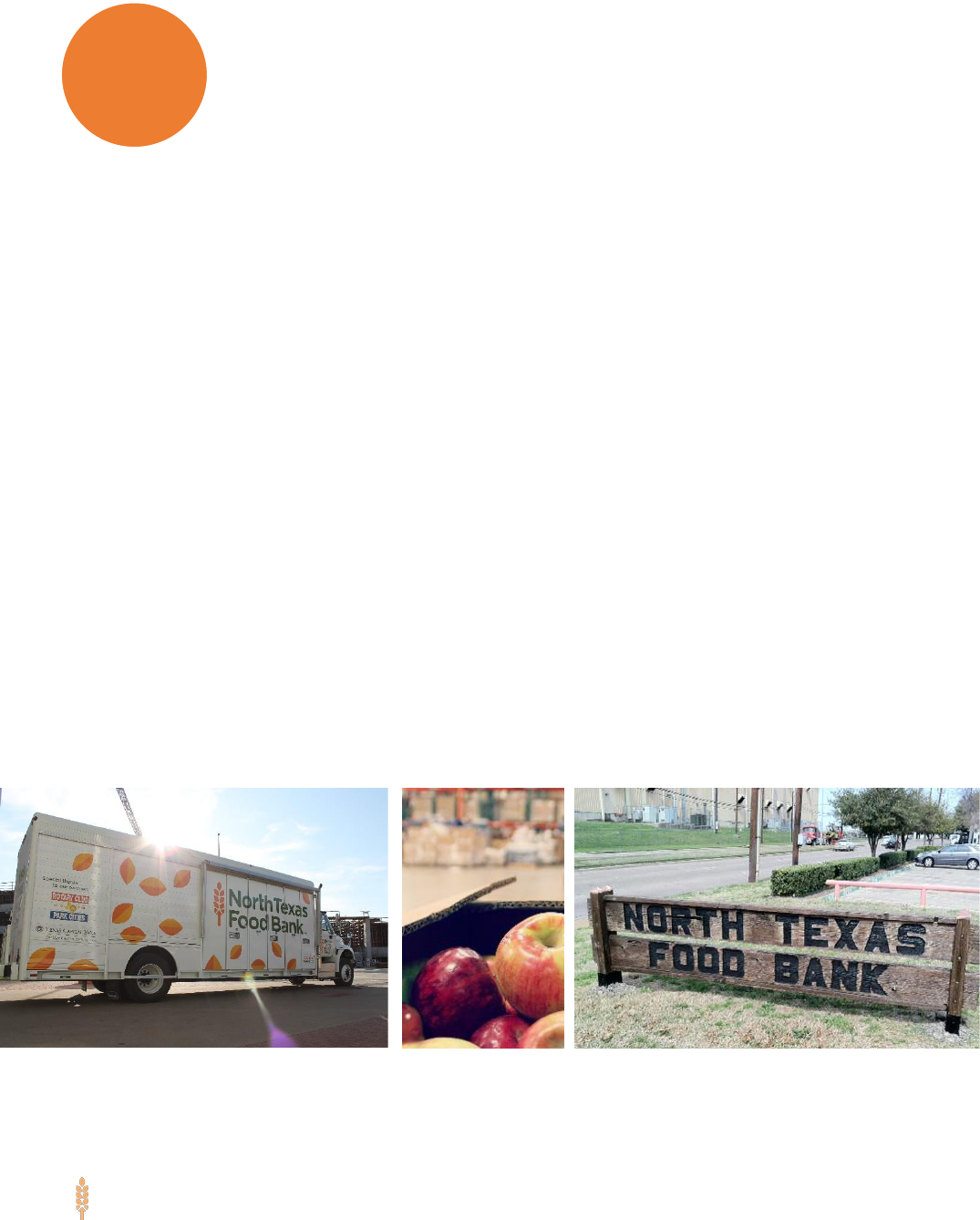
North Texas Food Bank 7
Introduction
A BRIEF HISTORY OF THE NORTH TEXAS FOOD BANK
In 1982, the North Texas Food Bank was established by Jo Curtis, Kathryn
Hall, Lorraine Griffin Kircher, and Liz Minyard. They decided to address the critical issue of
hunger in our community by distributing donations of surplus food and grocery products
through a network of charitable organizations.
This network included 13 counties: Dallas, Denton, Collin, Fannin, Rockwall, Hunt, Grayson,
Kaufman, Ellis, Navarro, Lamar, Delta, and Hopkins. In the first year, 400,000 pounds of food
were distributed.
In 1983, members of NTFB’s organizing committee joined members of the Texas Legislature to
help pass the Good Faith Donor Act, which protected donors from liability of donations or
donated product. After this, many more North Texans were inspired to donate.
Over the decades, the impact of hunger has grown. As NTFB entered the new century, the face
of hunger changed as the economic downturn led to North Texans at every income level
seeking food assistance.
Today, NTFB continues the fight against hunger as a certified member of the Feeding America
Food Bank Network. Feeding America, the nation’s largest domestic hunger-relief
organization, solicits food and grocery products from national suppliers, distributes them
through more than 200 food banks and provides food banks with operational support. It also
educates the public and government officials about the ongoing problem of hunger.
Section
1
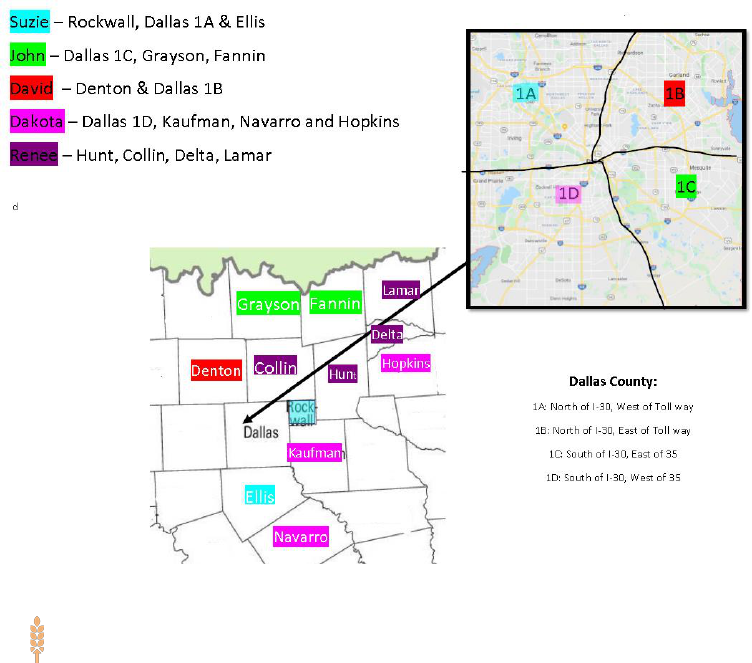
North Texas Food Bank 8
Our Values
Integrity: We are accountable, committed, and we strive for excellence.
Compassion: We are mission-focused, passionate, and advocates for those who need us.
Collaboration: We are innovative, team players and committed to respecting others.
Our Mission
To close the hunger gap in North Texas by providing access to nutritious food.
Our Vision
A hunger-free, healthy North Texas
Our Effectiveness
When you donate $1 you are providing access to three nutritious meals for hungry North Texans,
and 95% of our resources go directly towards hunger relief programs.
Who We Are
The Foodbank provides food and other essential items to partner hunger-relief agencies and
programs across 13 diverse counties. These partner programs operate food pantries, hot meal
sites, shelters and other hunger-relief programs in the neighborhoods and communities where
people need food.
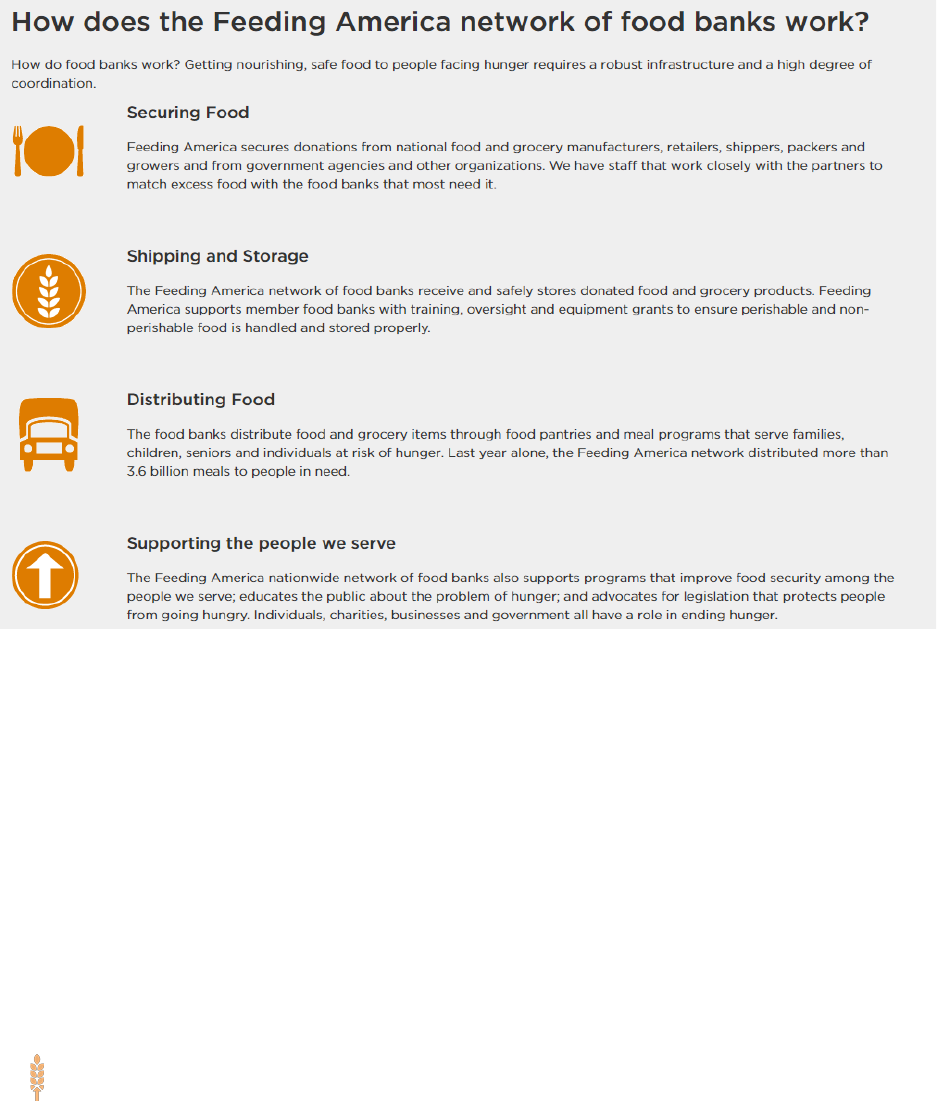
North Texas Food Bank 9
How We Work
The Food Bank provides an efficient operation to collect, sort and distribute food
donations secured from corporate food donors, state and federal food assistance
programs as well as Feeding America. Partner agencies are able to place food orders,
pick up the food and provide the food through their hunger-relief programs to benefit
their community or neighborhood.
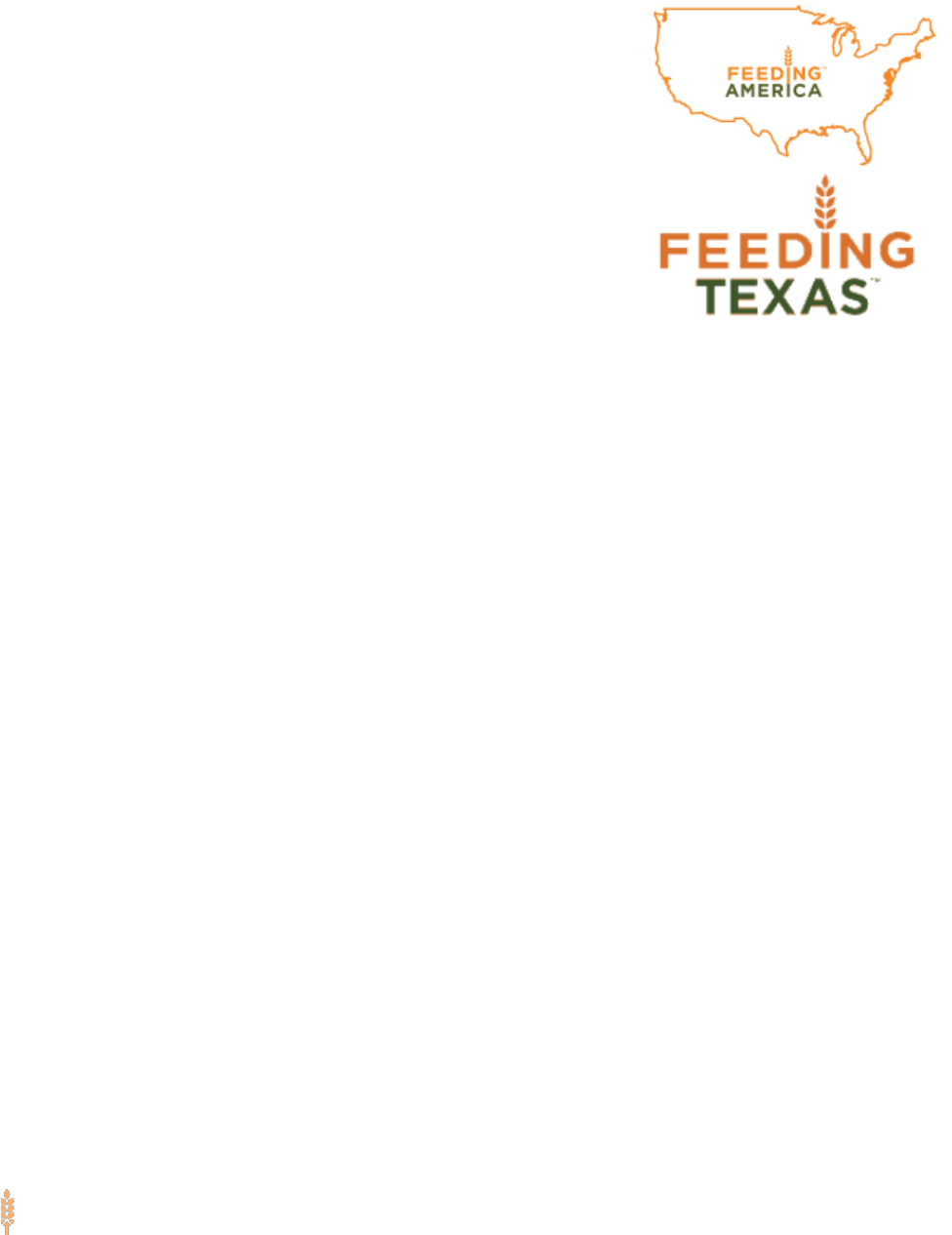
North Texas Food Bank 10
OUR PARTNERS
The North Texas Food Bank works with a range of partners to help us achieve our mission
Feeding America: The nation’s largest domestic hunger-relief
organization. Feeding America is a network of more than 200 partner
food banks, including North Texas Food Bank, which engages our
country in the fight to end hunger.
Feeding Texas: formerly known as the Texas Food Bank Network, is
a statewide, 501c3 nonprofit organization. Their mission is to lead a
unified effort for a hunger-free Texas. Feeding Texas moves millions
of hungry Texans toward food security through a statewide network
of food banks; strengthens the collective response of hunger
through collaborations and scaling success; and leads the public conversation to solve hunger in
Texas.
USDA/TDA: Texas Dept of Agriculture administers the United States Department of Agriculture
(USDA) commodities and enforces federal policies and procedures on the state level.
Food and Financial Donors: Local donors provide over one-third of our food donations. Financial
contributions from sources throughout the region subsidize operations and help keep free and
low-cost products on our menu.
Partner Agencies: NTFB works closely with more than 200 food pantries, soup kitchens,
shelters, and other facilities to ensure that we get nutritious food to those who need it. These
strategic partnerships are critical, with over 80% of NTFB food ultimately delivered via our
partner agencies feeding network.
NTFB supports each partner with a dedicated specialist and trainings. In addition to providing
food to partners, we also provide nutrition-related programs including SNAP benefits outreach
services and nutrition-education workshops. Partner agencies should have a clear mission, be
open to the public, and have adequate storage capacity. The most impactful organizations
demonstrate growth and/or offer wrap-around services. To learn more, go to ntfb.org/agency-
zone/.

North Texas Food Bank 11
OUR PROGRAMS
FOOD FOR KIDS
Elementary school children, experiencing food insecurity, often face hunger at
home when meals are not available during the weekends.
Working with educators to identify chronically hungry kids, the Food 4 Kids
program provides backpacks full of nutritious, nonperishable, kid-friendly food
items to take home each Friday afternoon during the school year. The program
operates in roughly 300 schools, serving up to 11,000 chronically hungry
children each week.
Schools interested in the Food 4 Kids program who have at least 50% of students qualifying for
free or reduced-price meals can reach out to [email protected] for more information.
SCHOOL PANTRY
Enrolled students and their families can access non-perishable items, as well as fresh produce,
through participating schools.
Distribution occurs once a month, typically after school. Students who visit the school pantry
leave with 20-25 pounds of shelf-stable food items and 15 pounds of produce.
School Pantry Programs operate in schools with at least 90% of students qualifying for
free/reduced meals, within close-knit neighborhoods. Schools need a physical and/or drive-
through space to operate the program and two people who can serve as site coordinators.
Schools interested in the School Pantry Program can reach out to [email protected] for
more information.
SOCIAL SERVICES ASSISTANCE
The Supplemental Nutrition Assistance Program (SNAP) supports the nutritional needs of low-
income families as one of the nation's most important defenses against hunger.
NTFB offers free SNAP information and application assistance, helping to increase enrollment in
North Texas. In FY20, NTFB provided access to 25.7 million meals through the SNAP program
with an estimated $60 million in SNAP funds distributed into the economy of our service area.
NTFB also assists applicants when they are applying for CHIP, TANF, Medicaid, Women’s Health
Program, and Medicare Savings Programs.
To learn more call (214) 269-0906 or go to https://ntfb.org/snap-information/ to contact a
SNAP representative.

North Texas Food Bank 12
MOBILE PANTRY
Like a market on wheels, the North Texas Food Bank’s Mobile Pantry program is a traveling
pantry that delivers nutritious food, including fresh produce and refrigerated items, directly to
communities with high need.
NTFB’s Mobile Pantry program collaborates with NTFB Partner Agencies and other community
organizations to serve high-needs areas during both disaster and non-disaster times.
Participating households can receive up to 50 pounds of food per visit.
In FY20, NTFB delivered over 1400 mobile pantry drops, distributing over 12 million pounds of
food to our neighbors in need.
To learn more about our Mobile Pantry program, visit ntfb.org/mobile-pantry/.
NUTRITION SERVICES
NTFB provides free culinary and nutrition education to SNAP eligible children, adults, and
seniors. Annually, we reach over 1,600 low-income individuals through cooking
demonstrations, workshops, healthy pantry initiatives, and grocery store tours. NTFB also
distributes around 120,000 free nutrition education materials, including recipes and cookbooks,
to promote and support health education for food-insecure audiences. All resources are
provided free of charge to agencies serving at least 50% low-income populations.
More nutrition content, including recipes, can be found at ntfb.org/our-programs/nutrition-
services/. For more information, please email [email protected].
PARTNER GARDENS
Partner Gardens are community gardens located in the North Texas Food Bank’s 13-county
service area that donate at least 10% of their annual yield to one of the Food Bank’s many
Partner Agencies. NTFB works with over ten Partner Gardens throughout North Texas.
The gardens range in size and location and offer many different varieties of produce. As a
partner, gardens can receive assistance from the Food Bank through resources, shared
knowledge, and collaboration.
To learn more about becoming a Partner Garden, visit ntfb.org/partner-gardens or
email [email protected].
COMMODITY SUPPLEMENTAL FOOD PROGRAM (CSFP)
Serving low-income seniors, the North Texas Food Bank directly partners with the Texas
Department of Agriculture (TDA) to distribute a senior food box program called CSFP
(Commodity Supplemental Food Program), locally known as PAN (People and Nutrition). Each
month NTFB serves over 8,000 seniors in need.
Participants can receive a pre-packaged box of approximately 36 pounds of non-perishable food
once a month provided by the United States Department of Agriculture (USDA) at one of
multiple distribution sites. Seniors 60+ who are interested in learning more can email
[email protected] or call (214) 367-3123.

North Texas Food Bank 13
ABOUT NORTH TEXAS FOOD BANK
Food Bank Days and Hours of Operation
Front Desk - 214-330-1396
Monday through Friday 8:30 to 4:30
Agency Distribution Service Hours
Monday through Friday 7:00 to 11:30 am and 12:00 to 3:30 pm. Closed Saturday and Sunday
Holiday Schedule
The Food Bank’s online ordering system, Agency Express, is available during all holidays
observed by the Food Bank. Pick-ups and deliveries will resume the next business day, unless
otherwise stated. The Food Bank is closed on the following holidays:
•
New Year’s Eve and Day
•
Memorial Day
•
Independence Day
•
Labor Day
•
Thanksgiving Day and the following Friday
•
Christmas Eve and Day
Inventory System
NTFB performs an annual inventory audit of items in the warehouse. The dates to complete this
task usually fall in the month of June. During the inventory audit, Agency Express is closed, and
no orders may be placed. Since there can be no product movement during this time, no pick-
ups or deliveries can be scheduled. Agencies will be given at least two weeks’ notice prior to
inventory closure so that you may plan accordingly.
INCLEMENT WEATHER POLICY
Snow or Ice (Monday - Friday)
If your agency has a delivery scheduled or an order to be picked up at the warehouse on that
day, please see NTFB’s main webpage (www.ntfb. org), NTFB’s Facebook page, or call NTFB’s
regular business number at 214-330-1396 after 6:00 a.m. There will be a message stating
whether the Food Bank will be open, closed, or delayed from normal business hours. There will
also be an alert on the online shopping homepage.

North Texas Food Bank 14
Delayed Opening
When NTFB experiences a delayed opening, communication will be made via the NTFB website,
our Facebook page, and our main phone number acknowledging the delay
•
If we have a delayed opening and you are scheduled to pick up, please contact your
Community Partner Representative to determine if your pick-up will occur as planned or if
there is a need to reschedule
•
If you have a scheduled delivery on a delayed opening day, please expect a late delivery or
a need to reschedule the delivery. To get further information, please contact your
Community Partner representative to make those arrangements.
Closed
If you have an order to pick up on the day of the closure, then your order will be available on
the next business day unless you contact your Community Partner representative to schedule
an alternate day.
If your scheduled delivery occurs on one of these bad weather days, a manager of the
Transportation team will decide about whether to reschedule or cancel the delivery. Affected
Partner Agencies will be notified within a reasonable timeframe by you CP representative.
*NOTE* If we are unable to reschedule the delivery, NTFB is not able to guarantee the space to
“double-up” your next scheduled delivery. That will be a real-time decision based on truck space.
For further information or to make alternate arrangements and requests, please contact your
Community Partner representative and we will do our best to accommodate your needs. Be
sure to include your agency name, number, and purchase order number when available.
If NTFB is closed more than one business day
If the food bank is closed or there is a delayed opening for more than one consecutive business
day, we are unable to guarantee your order will be processed and ready as previously
scheduled. NTFB processes orders two business days ahead of the distribution date (delivery or
pick- up) and if consecutive delays in operating hours occur, the picking process of orders will
be delayed. NTFB will work to alert all delivery sites of their delivery status on the next open
business day. If you have a pick-up scheduled, please feel free to call and clarify if your order is
ready.
Staff Contacts
For a full list of staff, please see the Calling Tree for an up-to-date listing or any NTFB personnel
can be reached via email by the following terminology: [email protected]

North Texas Food Bank 15
Partnership & Liability
As partner agencies of the North Texas Food Bank, organizations must
adhere to certain standards and responsibilities as outlined in the Partner
Agency Agreement. Failure to comply with the Partner Agency Agreement
and the associated responsibilities could lead to the suspension and/or end
of partnership with the Food Bank. This section outlines the legal provisions that inform the
content of the agreement.
The Emergency Food Assistance Program (TEFAP)
The Emergency Food Assistance Program (TEFAP) is funded under the U.S. Farm Bill and
administered at the Federal level by the Department of Agriculture’s Food and Nutrition
Service. The USDA uses the funding for TEFAP to buy food, including processing and packaging.
This food is also known as commodities. The amount of commodities allocated to each of the
states is contingent on its amount of low-income and unemployed population. Each state
designates a department or agency within the state to regulate the administration and
distribution of the commodities. TDA provides all guidelines for agency eligibility, handling and
storage of the commodities, distribution to clients, client record maintenance and all other
program related materials.
The Good Faith Donor Act – Texas Law
On June 10, 1981, the Texas State Legislature passed legislation, commonly referred to as the
Good Faith Donor Act, to address liability for damages resulting from the condition of donated
items. The state law reads as follows: A person who donates apparently wholesome food to a
nonprofit organization for distribution to the needy is not subject to civil or criminal liability
that arises from the condition of the food, unless an injury or death results from an act or
omission of the person that constitutes gross negligence, recklessness, or intentional
misconduct. A nonprofit organization that distributes apparently wholesome food to the needy
at no charge and that substantially complies with the applicable local, county, state, and federal
laws and rules regarding the storage and handling of food for distribution to the public is not
subject to civil or criminal liability that arises from the condition of the food, unless an injury or
death results from an act or omission of the organization that constitutes gross negligence,
recklessness, or intentional misconduct.
Section
2

North Texas Food Bank 16
The Emerson Good Samaritan Food Act – Federal Law
On October 1, 1996, the Emerson Good Samaritan Food Donation Act (Emerson Act) was
enacted. The Emerson Act is a federal law that provides national standards regarding food
donations so that donors have consistent liability information for interstate donations.
The law addresses the liability concerns of donors who contribute food in good faith and states
the following: To encourage the donation of food and grocery products to nonprofit
organizations for distribution to needy individuals by giving the Model Good Samaritan Food
Donation Act the full force and effect of law. A person or gleaner shall not be subject to civil
or criminal liability arising from the nature, age, packaging, or condition of apparently
wholesome food or an apparently fit grocery product that the person or gleaner donates in
good faith to a nonprofit organization for ultimate distribution to needy individuals, except
that this paragraph shall not apply to an injury to or death of an ultimate user or recipient
of the food or grocery product that results from an act or omission of the donor constituting
gross negligence or intentional misconduct. The term “apparently wholesome food” means
food that meets all quality and labeling standards imposed by Federal, State, and local laws
and regulations even though the food may not be readily marketable due to appearance, age,
freshness, grade, size, surplus, or other conditions.
Partner Agency Agreement
There are regulations set by Feeding America, USDA, TDA, and Feeding Texas that must be
followed to maintain a contract.
Each Agency must have a signed Partner Agency Agreement and TEFAP Agreement on record.
Each agency receives a Compliance Audit; the NTFB representative will ask the Executive
Director to sign a new Partner Agency Agreement and TEFAP Agreement. This will ensure a
signed agreement by current Agency Executive Directors.
All Partner Agencies are expected to abide by the rules and regulations specified in the
agreement. The key people in your
organization should be familiar with both the contract and the requirements.
Suspension
A Partner Agency may be placed on probation or suspended for using donated food or other
products in a manner that is not approved by the Food Bank. Failure to comply with Food Bank
requirements may result in loss of Food Bank partnership.

North Texas Food Bank 17
Voluntary Termination of Partnership
Either the Agency or NTFB may voluntarily terminate its partnership, for any reason,
in writing by the highest authorized person of the program, at any time. If terminated by the
Agency, the Agency will be responsible for immediately paying NTFB any outstanding/owed
handling fees or other fees for products received prior to its termination.
Involuntary Termination of Partnership
If any of the terms or conditions of partnership are violated by the Agency, NTFB has the right
to terminate the partnership. Alternatively, NTFB may suspend the Agency’s active status and
implement a plan of corrections that will require full compliance prior to removal of the
Agency’s suspension. The decision to terminate or suspend an Agency shall be governed
exclusively by the decision of NTFB.
Possible violations include, but are not limited to:
• Paperwork discrepancies
• Procedural misconduct
• Civil Rights violation
• Legal infractions
• Over limit/Account arrearage
See Download a Document on Agency Zone for a copy of the Partner Agency Agreement and the
requirements for partners.
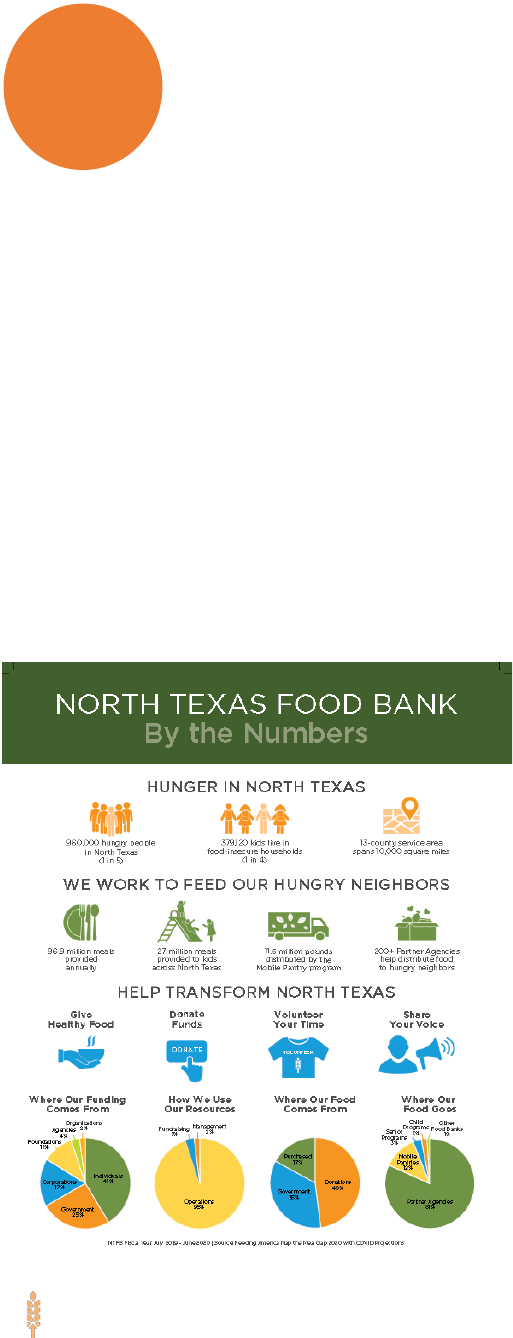
North Texas Food Bank 18
Agency Ordering
Food Sourcing
Where does NTFB get its products?
• Local Donations: Local food companies, wholesalers, distributors, retailers, community
members, faith groups, and businesses
• Feeding America: The national nonprofit organization that solicits donated food and
grocery products from national suppliers for distribution through the food bank network
• USDA: The United States Department of Agriculture provides food through The Emergency
Food Assistance Program (TEFAP)
• NTFB Purchased Food: We purchase a variety of staple items from outside vendors to help
ensure a reliable supply of nutritious foods to our feeding programs. Our core inventory
items include nutritious items from the main food groups including grains, fruit and
vegetables, protein (both animal based and plant-based proteins) and dairy.
NTFB By the Numbers
Section
3

North Texas Food Bank 19
Additional Sources of Product
The Agency should not rely exclusively on NTFB for its food and grocery products. Agencies
should make an effort to obtain other sources of food by seeking donations, working with
sponsors, and, if necessary, by purchasing from a wholesale or retail store.
Food Forecast
The NTFB publishes a Food Forecast monthly that lists USDA and purchased products we expect
to have available. This allows an Agency to plan their ordering schedule around the products
available in the Download a Document section of our website.
Available Products
Handling Fee (HF) Items: Items that are costly to source, store, and distribute have a shared
handling fee. Current HF items are $0.14 cents (USDA & local donations) and $0.28 cents (NTFB
purchased food) per pound and may be revised at the discretion of the NTFB Board of
Directors. Examples include most canned goods, meats, and dairy.
Non-HF Items: Items available at zero HF to the Agency; available on the shopping list and as an
add-on when picking up from NTFB directly. Examples include produce, bakery items, and most
beverages.
Co-Op Items: These items are available to the agency at a fixed price that is set with the
distributor and NTFB at the time of purchase. The cost of that Co-Op price can vary.
Pantry
type
• All products
• No: #2 cans or Bulk meat
Onsite
type
programs
• All products
Snack
type
programs
•
Cereal, juices, snacks, milk, fresh and canned fruit, peanut butter, bread,
paper products, cleaning products, hygiene products
•
No: meats, grains, canned/frozen vegetables, seasoning, non-food items:
house accessories, etc.
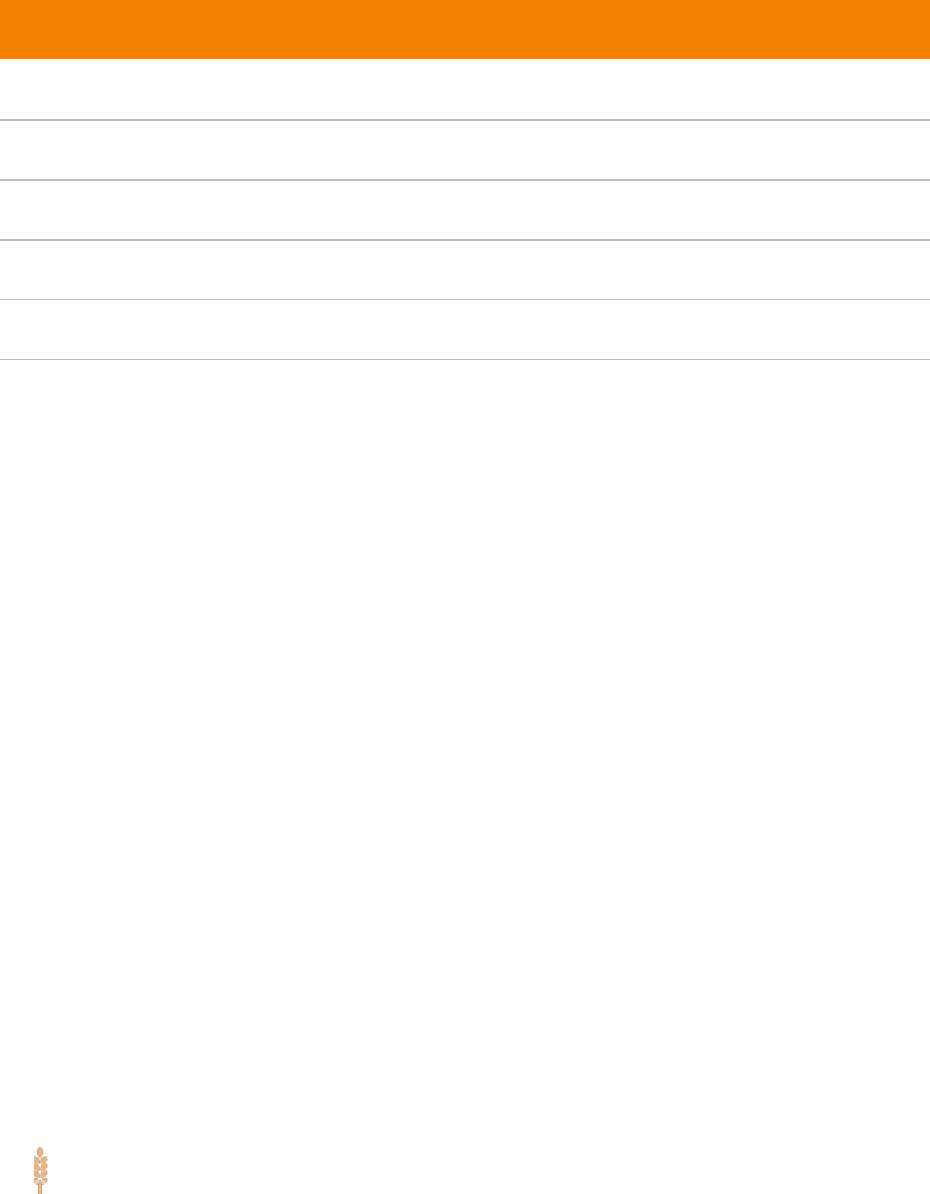
North Texas Food Bank 20
Ordering Deadlines
Agencies are allowed to place multiple orders for the same day. All orders must
be submitted at least two business days prior to delivery and/or pick-up date.
Please see the chart below for order deadlines.
Need order by:
Order due by Close of Business
Monday
Wednesday of the previous week
Tuesday
Thursday of the previous week
Wednesday
Friday of the previous week
Thursday
Monday
Friday
Tuesday
Submitting Orders
It is the responsibility of the Agency to ensure that orders are submitted properly. If the process
is not followed completely, NTFB may not receive the request and the order may be cancelled
or postponed to the next available pick-up or delivery date. Please contact your representative
if you any issues
• When you find additional product, you wish to add to the same order, simply edit the order
to add the extra product.
• Agencies cannot place orders more than 2 weeks in advance of pick up/delivery date
• Agencies with monthly deliveries can place weekly orders choosing the correct delivery
date. If the calendar is not open with dates, the Agency can choose the date closest to their
delivery date, email your representative to change to the correct delivery date.
• There is a flat fee of $100 restock fee for orders cancelled after they have been processed
and pulled.
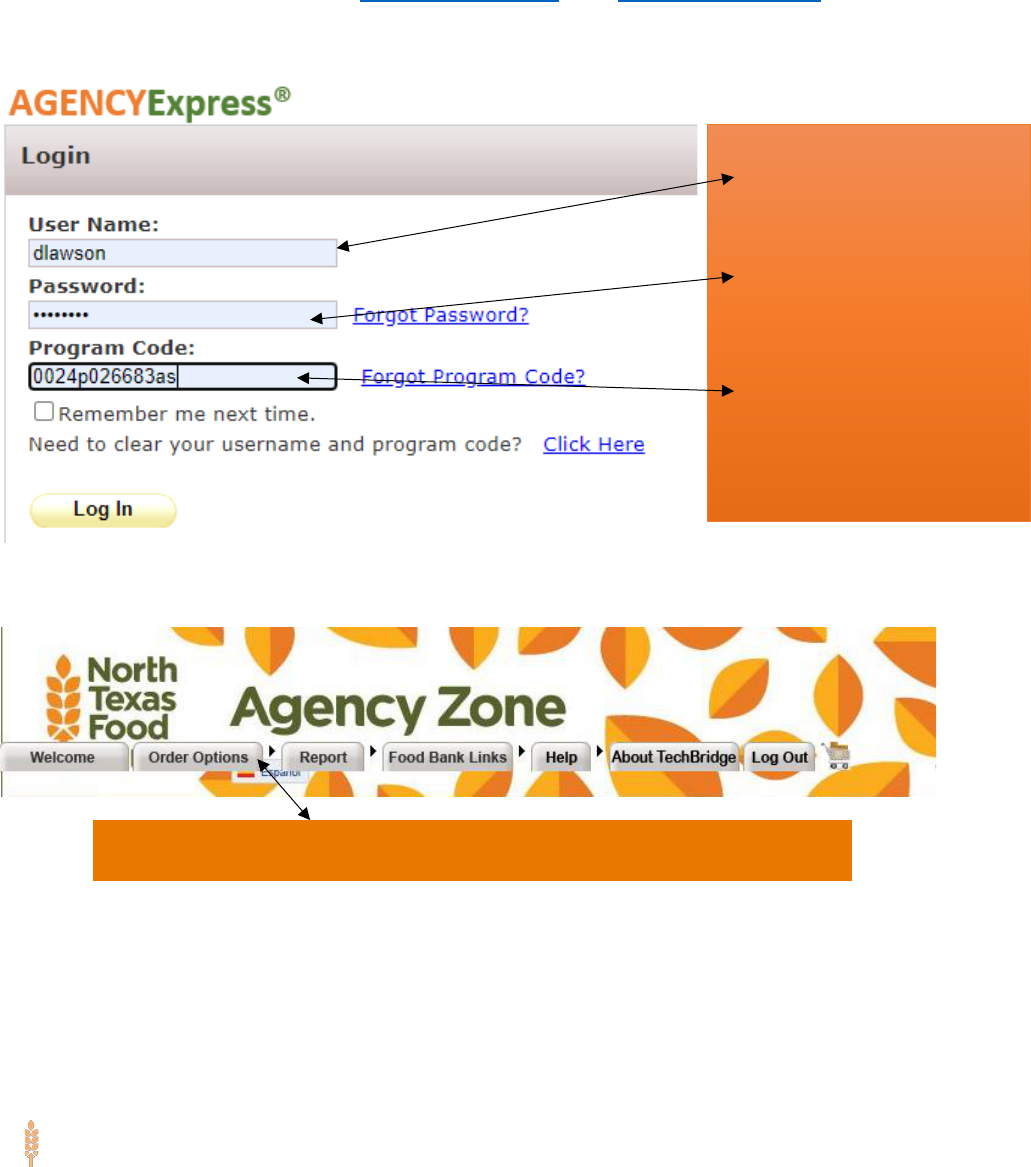
North Texas Food Bank 21
Online Ordering
To access Agency Express, you will need a login ID, password and a program code that is
assigned to each agency by a CP Representative. Online ordering provides a real time inventory
of the available case counts of product for your agency. If you are new agency or staff, please
request one from the CPR Team and [email protected]. Go to www.ntfb.org/home Click
Agency Zone, then click Online Shopping from the Agency Tool Box. You will be taken to a
separate website called Agency Express.
Enter user ID: First letter of
first name followed by last
name (ex: dlawson)
Enter password: change12
(generated for and by your
agency)
Enter program code: 0024p
followed by Agency ID#
(ex:0024p013600mp)
Click Order Options, then choose Shopping List
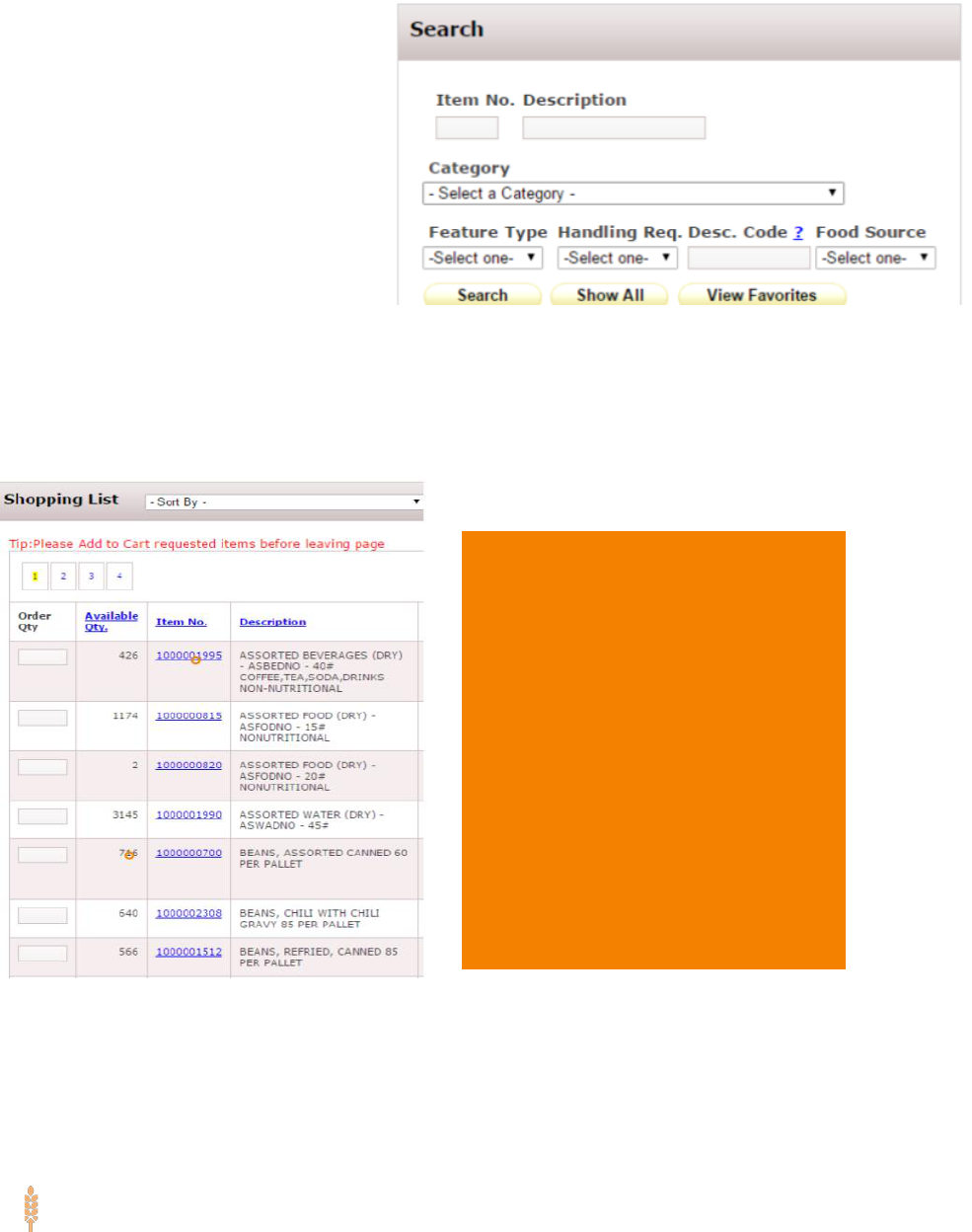
North Texas Food Bank 22
Select an option for searching:
1. Show All- This will bring up all the available items in stock. This is the fastest way to view all
items!
2. Item Code - Search by item code
3. Item Name/Item Description-
Search by description
4. In the Description Code section,
type “Often,” “Sometimes,” or
“Rarely” to auto populate a list of
food items in each of those
categories. Choose items in the
‘Often’ and ‘Sometimes’ category
as much as possible. Try to avoid the ‘Rarely’ category as these items are high in sugar,
saturated fat, and/or sodium.
Enter desired quantity by cases then click “add to cart”
When selecting product, pay
close attention to the packaging
information.
TIP: click on item number and
will give you additional information
about packaging.
TIP: pay attention to available
quantity to ensure you get what you
need.

North Texas Food Bank 23
How to read the item detail
Gross weight
Total weight of case
Handling req.
Frozen, Refrigerated, dry
Item name
Description and pallet packing. In this description you will see how many cases you will need
to order if you want to order a pallet. As well as how many cases make a layer within that
pallet.
Pack size
How many items are with the case or if it is bulk and weight or size of individual item within
case
Price per unit
Total cost of that item depending on Handling fee assigned to that item
Notes about packing description
Assorted – the case for an assorted
product includes variety of brands,
sizes and flavors of an assortment of
different product types
Bulk – the product is not
individually packaged, and it is
typically loose in the case
#10 can – a large
restaurant style canned
goods
(Commercial)
You have the option of deleting an item, changing the quantity of an item or continuing to shop
from this page. (Pay attention to the total weight of your order and available credit limit.)
Before submitting your cart, you must choose a pickup method and pick up/delivery date and
time.
Click “Submit Cart” to place order
Once complete, click
“Checkout” (located at the top
right-hand side of the list)

North Texas Food Bank 24
My Appointment
You must select a method of receiving your product pick up or delivery. Please note that all
deliveries must be pre-approved by NTFB before choosing this method.
When placing an order, you can choose:
Pick Ups: Monday – Friday 7 a.m. or 9 a.m.
Deliveries: Available upon approval. When
choosing the delivery date. NTFB will work
in conjunction with the CPR team to
determine best delivery day and time
window to ensure optimal utilization of
assets.
Agency Express Tips
Shopping Cart Summary: The agency’s available credit limit reflects the outstanding balance
plus the current order being placed. If you exceed that amount, the online ordering system will
block you from placing your order.
PO Number: A PO number is established once an item is added to the shopping cart. This does
not mean your order is complete. Once your order has been processed, the PO number
converts to an AI number (Agency Invoice).
Order Management: Once your order is placed, you will be re-directed to Order Management,
where it lists current and past orders.
Order Status Explanation:
•
New Order: Status appears once an order is submitted.
•
Sent to Food Bank: The order has been sent from Agency Express to the Food Bank
system.
•
Acknowledged: The order has been received from Agency Express and is being processed.
You can edit the order at any time that it is in this status.
•
Released: The order has been completely processed and is ready for pick up. No
changes/cancellations can be made through Agency Express from this point.
•
Invoiced: Once the order is fulfilled and received by the Agency, it is invoiced. Please note:
The item quantity and the total amount due on the PO may not reflect the same amounts
on your invoice.

North Texas Food Bank 25
•
Cancelled: When cancelling an order, make sure the process has been completed by
checking the status in order management, which should state “Cancelled”. Once that is
complete, please email your CP representative and inform them that the order has been
cancelled.
Online order updates: The online inventory system is updated every 3 to 5 minutes. This will
update available quantities and add additional items received throughout the day. Remember,
items are on a first- come first-served basis. Depending on the number of orders, some items
may be out of stock by the time an Agency’s order is validated.
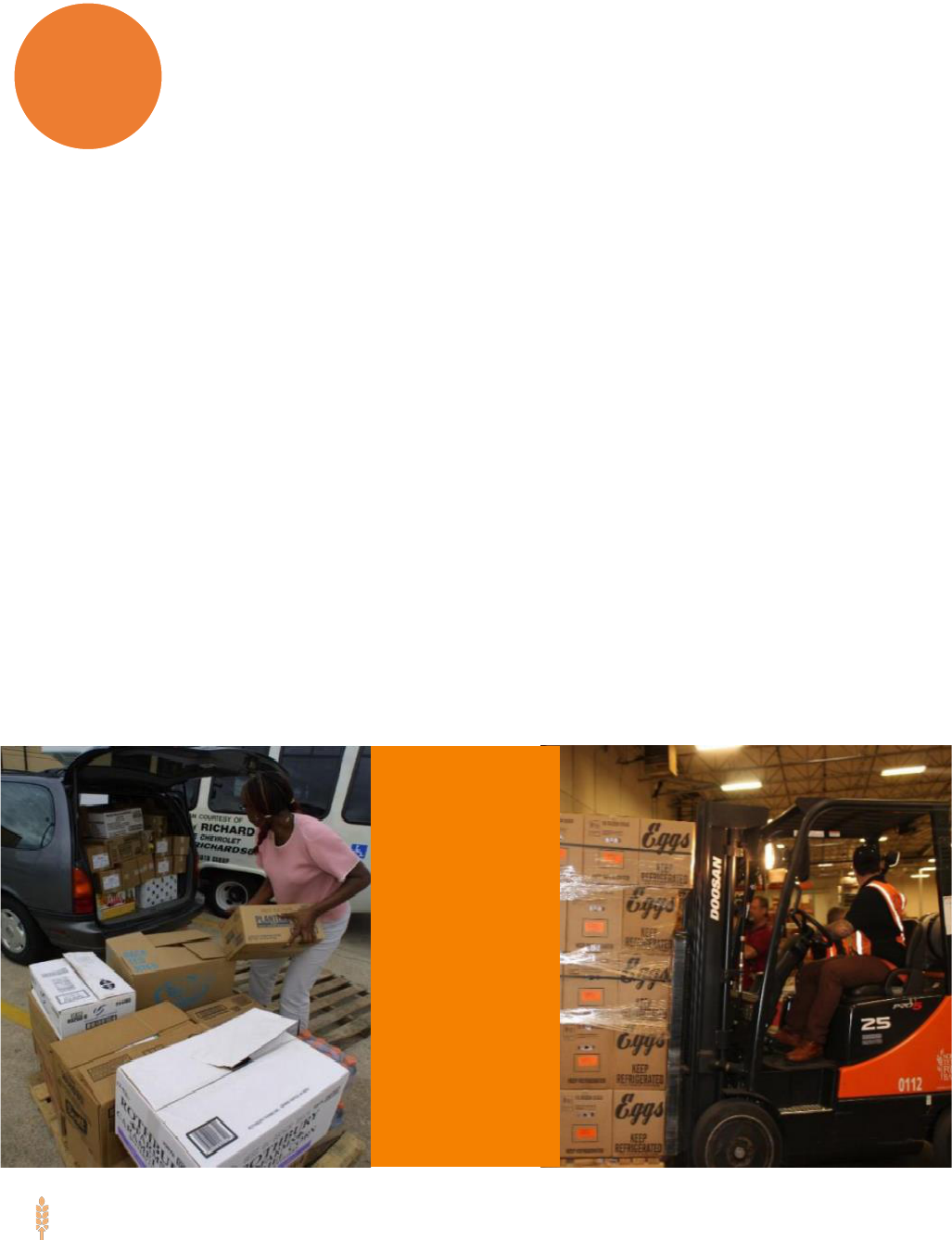
North Texas Food Bank 26
NTFB Warehouse Policies
Picking Up Orders
In an effort to support an organized, safe warehouse environment, the North Texas Food Bank
reserves the right to enforce safety policies and procedures, rules and regulations; this applies
to all employees, Partner Agencies, volunteers, and visitors. These standards also ensure that
all agencies receive efficient service while complying with OSHA requirements.
•
Please adhere to all Food Bank facility requirements while in the warehouse, as listed
below:
•
No eating or drinking is permitted in the warehouse; spills can pose serious safety hazards
•
Closed-toe shoes are required for anyone entering the warehouse
•
Cell phones cannot be used in the warehouse
•
Please stay within the designated areas of the warehouse. Agencies are not permitted
near shipping dock or throughout the general warehouse without supervision.
•
Partner Agency’s representatives must sign invoice for food received before leaving
•
No additional product will be given without NTFB Specialist or Manager approval; for
example: Product that is available for order online cannot be added to an order on the
day-of pick up.
•
Please follow
any other safety
instructions given
by a Food Bank
staff member
and notify any
personnel of
potential safety
hazards.
Section
4

North Texas Food Bank 27
Agency Distribution
Agencies pick up their orders on the date and time scheduled through the online system and
are on a first come, first serve basis. Orders will not be ready for distribution until the date that
was scheduled in the ordering system. Once you receive your order, all products must go
directly to previously approved locations, and products requiring refrigeration that are not
immediately distributed must be properly stored. There is a restocking fee of $100 if items are
not picked up on the scheduled day.
Pick up is defined as an Agency coming to the North Texas Food Bank to retrieve products.
Agencies picking up have the option of utilizing the add-on list
•
Add-on List: Items such as produce and bakery, milk
•
Produce: Items in bulk
Pick-Up Information
•
Pick-ups take place at NTFB’s Perot Family Campus, located at 3677 Mapleshade Lane in
Plano, 75075.
Delivery
Delivery is defined as an Agency receiving products from a North Texas Food Bank truck. We
may deliver directly to an Agency or to a centralized location where several Agencies will meet
the truck and take their products back to their facilities. When delivery is made directly to an
Agency the product will be dropped at the entrance of the Agencies facility and the driver will
not perform an inside delivery unless we have a signed Indemnification from the Agency.
Driver is to call the Agency before he leaves his prior stop to inform the Agency of his ETA. We
ask that you give the truck the entire delivery window before he is considered late. If the truck
is late, contact your CP representative for an update. As standard procedure, the driver of the
truck should call the contact on the invoice to let them know if there is a delay for any reason.
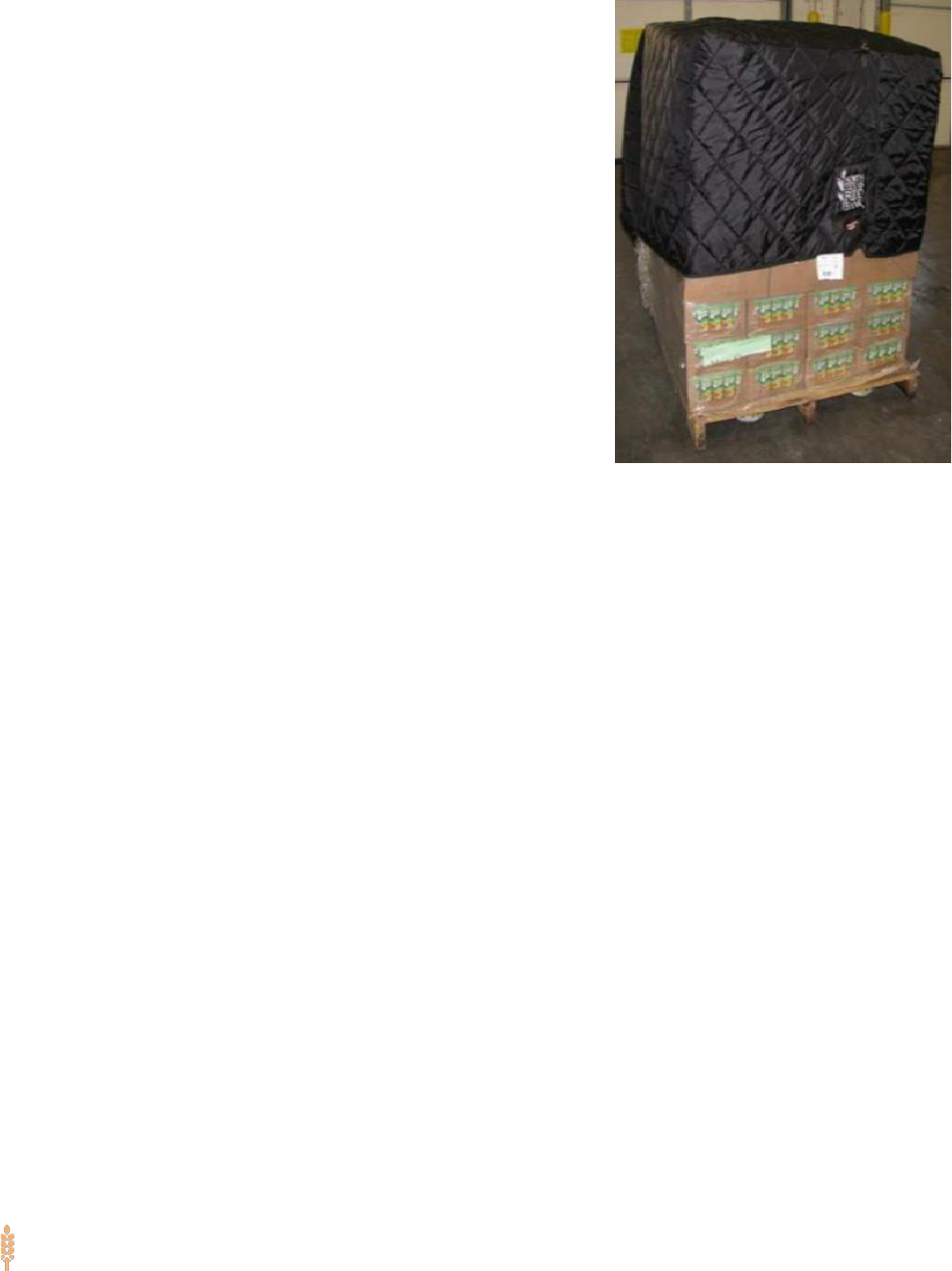
North Texas Food Bank 28
Pallet Blanket for Refrigerated Products
All Partner Agency representatives receiving refrigerated
products either from NTFB or group delivery sites will be
REQUIRED to use the pallet blankets to transport the goods.
• Once your pallet blankets are issued, you will not be allowed
to receive your order with refrigerated items without it.
• There is a $95.00 non-refundable replacement fee for all lost
or forgotten pallet blankets
• It is the agency’s responsibility to secure the blanket with
items such as bungee cords, straps, or nets.
Product Return Policy
NTFB is committed to providing Partner Agencies and clients
with safe food. All items are inspected upon arrival at the North
Texas Food Bank. Partner Agencies are responsible for inspecting all orders for purity and
fitness for consumption. Please check for accuracy and ensure that all products are in good
condition. If you notice any issues, please contact the Inventory Team immediately. This policy
applies to pick-ups and deliveries.
Possible order discrepancies:
•
Missing items
•
Incorrect items
•
Excessively damaged goods
•
Items not ordered
*Please keep in mind that when you receive assorted items, approximately 10% or more of
items may be unusable. This will not be credited and will need to be discarded by your agency.
The process of picking, pulling, loading, and delivering is time consuming and labor intensive. As
such, it is requested that order modifications be made within 48 hours of staging or delivery. If
an order arrives that is fit for consumption and as ordered, yet the Partner Agency declines to
accept the order for various reasons, that Partner Agency will be charged a flat restocking fee of
$100.

North Texas Food Bank 29
Helpdesk Function
The new agency service desk is now the home for submitting credit requests; reporting order
errors, including delivery issues, invoicing concerns, and product quality issues; reporting
issues, including Agency Express concerns, to your CP rep via a form; and contacting helpdesk
directly with any comments or suggestions you may have. We welcome your feedback.
When you have a concern, please visit the Agency Zone page on the NTFB website and select
the “Agency Service Desk” option. If you are requesting credit for an order, please select the
option to submit a credit memo request; this will link through to the appropriate credit memo
request. Please see the addendum below for more information on credit requests. If you have
discovered an issue with your order or delivery, select the option to report an error with your
order; this will link through the Order Error Report. If you have a service request or concerns
regarding Agency Express, select the option to report an issue to your agency representative.
This will route you through to the NTFB Service Desk Request form. Finally, if you have any
other concerns, select the option to submit a comment or suggestion. This will route your
concerns to the helpdesk specialist for manual routing.
Credit Requests
To receive a credit to your invoice due to discrepancy, a credit request form must be completed
within 3 business days from which the product was received. The product must be returned in
the condition in which it was received. Products distributed in cases must be returned as a full
case, no exception. If you receive an incorrect item in your order and you wish to keep it, you
will be charged for the price of the item received.

North Texas Food Bank 30
Product Recall
If the Food Bank receives notification of a product recall on an item that we provided, your
Agency will be contacted immediately based on our list of Agencies that received that product.
However, we rely on your Agency to communicate this information to clients. If there was a
handling fee for the product, your Agency account will be credited the correct amount. NTFB
will also provide instructions regarding how to destroy recalled products.
If your agency receives recalled items, please take the following action:
• Check any donations that you receive for the applicable product
• Quarantine the product and wait for additional instructions from NTFB
• Promptly and efficiently provide food recall or advisory information to any of your
clients who may have received some of the recalled products through flyers, posters, or
informing clients in person.
• Do not return product to NTFB
The Recalled Product list can be found on the Download a Document section of our website.
Partner Agencies may visit www.foodsafety.gov or https://www.ntfb.org/agency-zone/recalls
for additional information.

North Texas Food Bank 31
Food Safety and Safe Handling
In effort to maintain the integrity of the food distributed by NTFB, while ensuring
it remains healthy and safe for consumption, agencies must be trained in proper
food storage and safe handling practices. Each agency agrees to observe safe food handling
practices in transportation, storage, handling, and distribution of food.
Required Food Safety Training
One representative from each agency must undergo food safety training to remain compliant
with NTFB’s policy. This ensures proper food safety knowledge and practices are being
implemented throughout our network. In the event the agency representative with food safety
training departs from the organization, notify the Food Bank as another representative will
need to be trained within 30 days.
Food Safety
in Food
Banking
•Food Pantries
•Product only
distributions
Food
Handlers
(2yr
certification)
•Food Pantries
•Onsites that do
not serve meals
Food
Managers
(5 yr
certification)
•All onsites
After School
Snack Food
Safety
•After school
sites
Section
5

North Texas Food Bank 32
Food Storage
Handling and Safety Practices
Safe food storage practices are an essential part of maintaining a good food program, pantry, or
onsite.
• Food should be stored in a room or area which will prevent the entry and harboring of pests
such as roaches and rodents. Check walls, ceilings and shelving, windows, doors and frames,
and seal or repair, as necessary.
• If the room cannot be locked, make sure it is clearly marked for the food program. If you
must use shared space, such as a part of a church kitchen, make sure your designated
storage area is clearly marked for your specific program’s food storage ONLY and that
everyone with access to the storage area understands this.
• Store food properly, keeping all food, including bulk bags, off floors. If necessary, you may
use pallets to store food in a pantry as long as they can be easily moved for cleaning and
inspection. Packaged pest-prone products such as rice and beans may need to be kept
• in tightly lidded, flexible plastic containers. Shelves should be far enough off the floor (at
least four to six inches) to be easily cleaned and checked for signs of food leakage or pests.
• Check food stock regularly for quality. inspect incoming food to make sure it is free from
spoilage or contamination. Rotate stock: first expired, first out. While checking food stock,
discard any bloated or rusty cans, containers without a label, open containers, out of date
baby food or formula, and containers which show signs of tampering. Leave room on the
shelves so that food can be easily moved around for inspection of stock and shelves.
• Discard anything you have doubts about. Contact your local health department for more
information about sorting and storing food, and for information about their requirements
for agencies that store and distribute food.
• Store unsorted product away from food that is ready for distribution.
• Store non-food items separately from food. Some common non-food items such as soaps
and cleaning products can be hazardous. Never store non-food items above or directly with
food.
• Occasionally when NTFB receives food from our retail partners, meats may be frozen prior
to their expiration date. You may distribute this to clients if that product is distributed
frozen within 6 months and clients are told to prepare the entire product immediately after
thawing. Previously frozen foods should never be thawed and then re-frozen.

North Texas Food Bank 33
Storage Practices
Clean Storage Areas Regularly
Keep food storage areas clean. Trash containers must be covered, isolated, and emptied daily.
All food storage areas should be checked and cleaned at least once per week, including
refrigerators, freezers, and floors. Specific cleaning chores should be assigned with attention to
detail. While cleaning, check for soundness of food (open containers or packages), leaks, and
signs of pests. If signs of pests are found, immediately discard any food with possible
contamination, find where the pests are coming in, and seal entrances. Sanitize the pantry with
a solution of one tablespoon bleach to one gallon of water.
Check the Date and Inspect the Product
Some foods may last beyond the “sell by” or “best when used by” date. The quality and
freshness may be compromised, but they are still considered safe to eat. Discard foods that are
bottled or jarred past the expiration date or if liquids appear cloudy or discolored. Always
inspect your product upon receiving. Refer to the ‘Distribution Guidelines’ document located in
the Download a Document section of the website.
When in doubt, throw it out!
The North Texas Food Bank’s policy is to discard bulging, rusted, or severely dented cans with
metal touching metal, opened or leaking packages, and broken seals. If you notice items with
these flaws when you unpack them at your facility, do not distribute them or cook with them.
Refer to the ‘Sorting 101’ document located in the Download a Document section of the
website.
Keep cold foods cold and hot foods hot
Frozen and refrigerated product should be maintained in cold temperatures during transport if
possible. It should also be delivered and stored as quickly as possible. Food that is exposed to
the temperature danger zone between 41-135 degrees Fahrenheit for more than 4 hours may
become unsafe to eat. Please use the freezer blanket, when transferring product or picking up.
If you lost yours or need a new one, contact your CP representative on how to attain a new
one.
Temperature control
Be sure to monitor your coolers and freezers for maintaining the proper and safe temperatures.
Functional thermometers must be present and visible in all storage areas. Temperature logs can
show discrepancies in climate over a period of time. Fluctuating temperatures can be a sign of
malfunctioning equipment which may need to be repaired or replace.
• Store non-perishable foods at safe temperatures. Non-perishable food should be kept in a
cool, dry area with proper ventilation. A small air conditioner may be necessary to

North Texas Food Bank 34
• maintain a moderate temperature (75 to 78 degrees) to protect food from extreme heat
and humidity.
• Store perishable food at safe temperatures. Keep temperature gauges in each refrigerator
and freezer compartment. Average safe temperature in refrigerators is between 34- and 40-
degrees Fahrenheit; freezers should be between 0- and -15-degrees Fahrenheit. Check
readings frequently.
Storage
Area
Proper
Temperature
Refrigerator
s
33°F – 40° F
Freezers
0° F or below
Dry Storage
50° F - 75°F
Additional guidelines for on-site feeding
All on-site feeding programs, including residential programs, must follow the proper
food storage and handling guidelines outlined in the previous section and the additional
guidelines below:
• All sinks, cooking equipment, utensils and serving ware must be clean, sanitized and
well maintained.
• Always wash hands with soap and hot water BEFORE handling food, preparing food,
and serving food.
• Always wash hands with soap and hot water AFTER preparing food, serving food,
handling raw meat, handling dirty dishes or utensils, handling garbage, using the
bathroom, eating, drinking, and smoking.
• When drying hands, it is best to use a disposable single-use towel.
• Please wear hair nets when appropriate and always wash your hands after touching
any part of your body.
• Always cover any cuts with a bandage and disposable gloves and change gloves
when they get soiled or contaminated. Wash hands BEFORE putting on disposable
gloves.
• When preparing food, make sure the food is cooked to the proper internal
temperature to kill or neutralize harmful bacteria. Use a stemmed-thermometer or
other food-grade thermometer to check for correct temperatures.

North Texas Food Bank 35
• Hot foods need to be kept at 135° F or hotter.
• Cold foods need to be at 40° F or below.
• When serving, make sure the food is maintained at proper temperatures to prohibit
bacterial growth and spoilage. Use a food-grade thermometer to check for correct
food temperatures. Cold food should be kept below 40° and hot food should be
kept at 135° or higher.

North Texas Food Bank 36
Monthly Reporting
As part of the Partner Agency Agreement, partner agencies are required to report statistical
data on how many clients are being served each month. This information is compiled by the
Food bank and reported to Feeding America and Texas Dept. of Agriculture. These statistics are
used to help determine program efficiency and allocation of resources.
30/31
1
5
7/8
10
Service month
ends
Agency to
submit reports
online
Report due
date: 5
th
of each
month
Email reminder
sent to agencies
to submit report
If not
submitted,
account
suspension: 10
th
of the month
Additional Information
All agencies are required to submit monthly totals:
•
If your program did not serve that current month, the report will simply need to reflect
zeros.
•
If your program did not receive product from the Food Bank, your Agency should still submit
a report of the number of people and/or meals served.
Multiple Programs
If your Agency has multiple programs, separate reports are required. Each program will have a
separate login. You must completely log out of one account in order to log in to the next
account. To do this, go to Agency Toolbox, Update my Account. There will be a “Logout” link on
the top left corner.
Unduplicated vs. duplicated data
It is extremely important that your agency reports unduplicated data. If a client is seen multiple
times, you only count that individual once per month.
•
Unduplicated reporting means reporting how many individuals visit per month, even if an
individual visited multiple times that month. For example, 1 client with 4 pantry visits in a
Section
6

North Texas Food Bank 37
month = 1 unduplicated client served
•
Duplicated reporting means reporting an individual EACH time they are served in a month.
For example, 1 client with 4 pantry visits = 4 duplicated clients served/month
Confirmations
Confirmations of the reports are sent electronically to the email address you provide at the
bottom of the report. If you do not receive a confirmation of the report, the most common
reason is because of a typo. Please make sure to verify the email address prior to submitting an
order to receive the report confirmation.
Types of Agencies
NTFB categorizes each program by a program type. The type of report you will submit monthly
depends on the type of program you have.
Pantry
•
Provides emergency food to clients in need that is
prepared/ eaten off-site.
•
Pantries are encouraged to provide a three to seven-
day supply of food for an individual or family (14-25
pounds per person).
•
Example: food pantries
Onsite Feeding
•
Provides a full meal that is prepared/eaten on-site.
•
Example: soup kitchens, homeless shelters, day care
facilities, after-school programs, senior nutrition sites,
battered women’s shelters, residential treatment
centers and family shelters
Supplemental
Feeding
•
Serves snacks on-site that does not require cooking.
•
Example: Boys and Girls Clubs, YMCA’s and after-
school programs
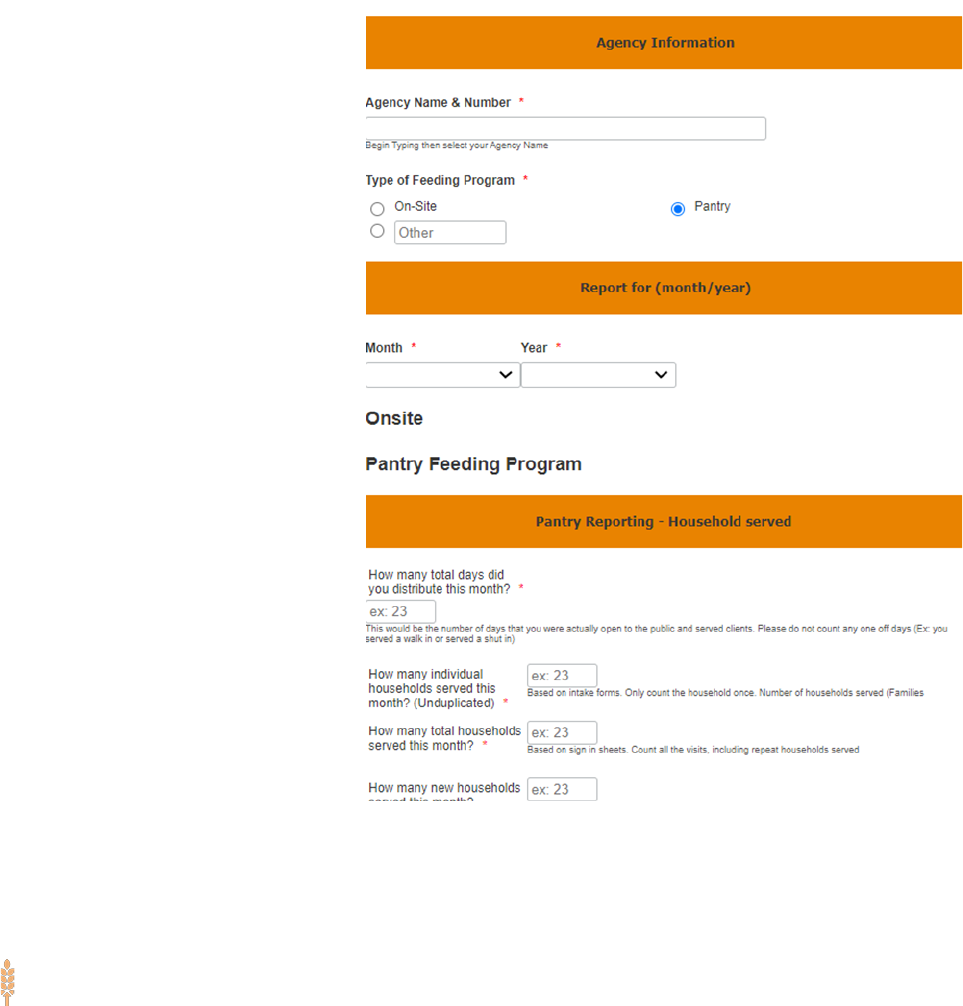
North Texas Food Bank 38
HOW TO REPORT
There are 2 different reports: one for Pantries and one for On-Site feeding or Supplemental
programs. Your daily logs will provide the information you need for reporting the number of
persons and/or meals served.
1. Go to www.ntfb.org/
2. Click Agency Zone, then click ‘Submit A Report’ in the Agency Toolbox
The easiest way to keep up with your monthly report is to mark your calendar “MONTHLY
REPORT DUE” at the end of each month.
• You have until the 5th of the
following month to turn your report
in. After the 5th the report is
considered late, and your Agency may
be placed on HOLD.
• If your Agency account is
placed on hold, it may take up to 24
hours to reactivate once the report is
received.
• Reports should be kept on file
either as electronic or hard copy for a
minimum of 1 year.

North Texas Food Bank 39
Pantry Reporting Instructions
This report asks how many unduplicated families, children, adults, and seniors were served in
the month.
How many total days did you distribute this month?
This would be the number of days that you were open to the public and served clients. Please
do not count any one-off days (Ex: you served a walk in or served a shut in.
How many individual households served this month (Unduplicated)?
Based on intake forms. Only count the household once. Number of households served
(Families)
How many total households served this month?
Based on sign in sheets. Count all the visits, including repeat households served.
How many new households served this month?
First time households to your pantry
What percentage of food comes from NTFB?
This number is the percentage of food that you received from the Food Bank in comparison to
the total amount of food used by your Agency during the month.
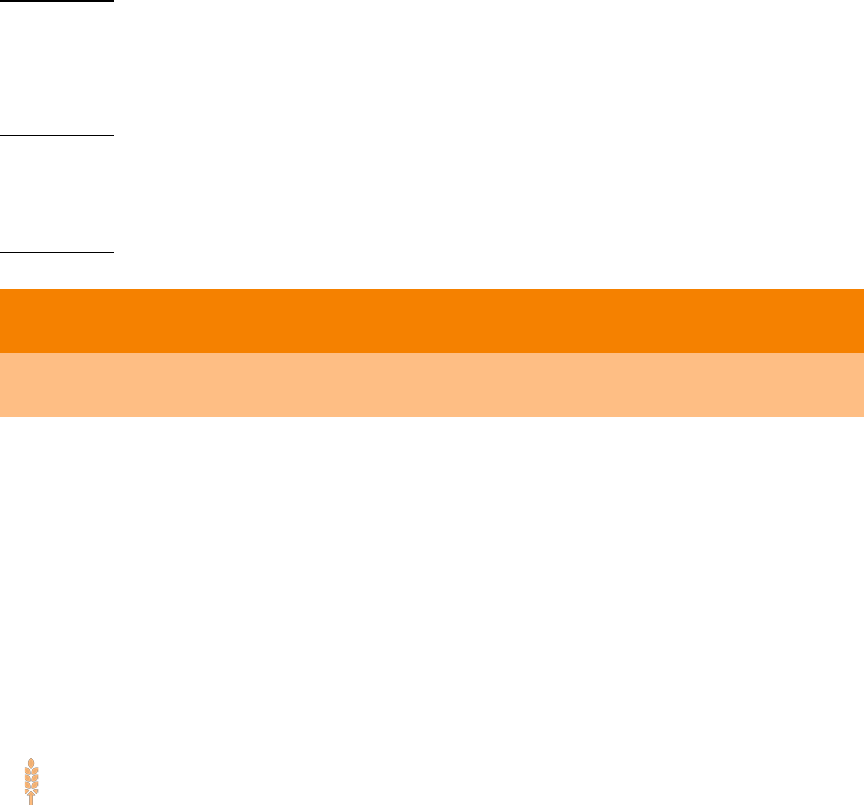
North Texas Food Bank 40
Onsite & Supplemental reporting tips
This report will ask the meal count for breakfast, lunch, dinner, and snacks. It will also ask the
number of children, adults, and seniors served.
Meal Count: This number is retrieved by multiplying the amount of people served by how many
times that meal was served.
Example: 30 children in an after-school program were served snacks 5 days per week (20 days
in one month); multiply 30 X 20 = 600. Snack count equals 600 and the children count equals
30.
This report will ask the meal count for breakfast, lunch, dinner, and snacks. It will also ask the
number of children, adults, and seniors served.
There are three frequent mistakes on-site programs make in their reporting:
Mistake #1: The meal count reflects the amount of days in the month instead of the amount of
meals served
Example of incorrect report: Breakfast: 30 Lunch: 30 Dinner: 30 Children: 100
Mistake #2: The amount of individuals matches the amount of meals served Example of
incorrect report: Breakfast: 100 Adults: 100
Mistake #3: Report averages instead of exact meal counts. Example of incorrect reporting:
300
300
300
100 children
278
281
297
100 children
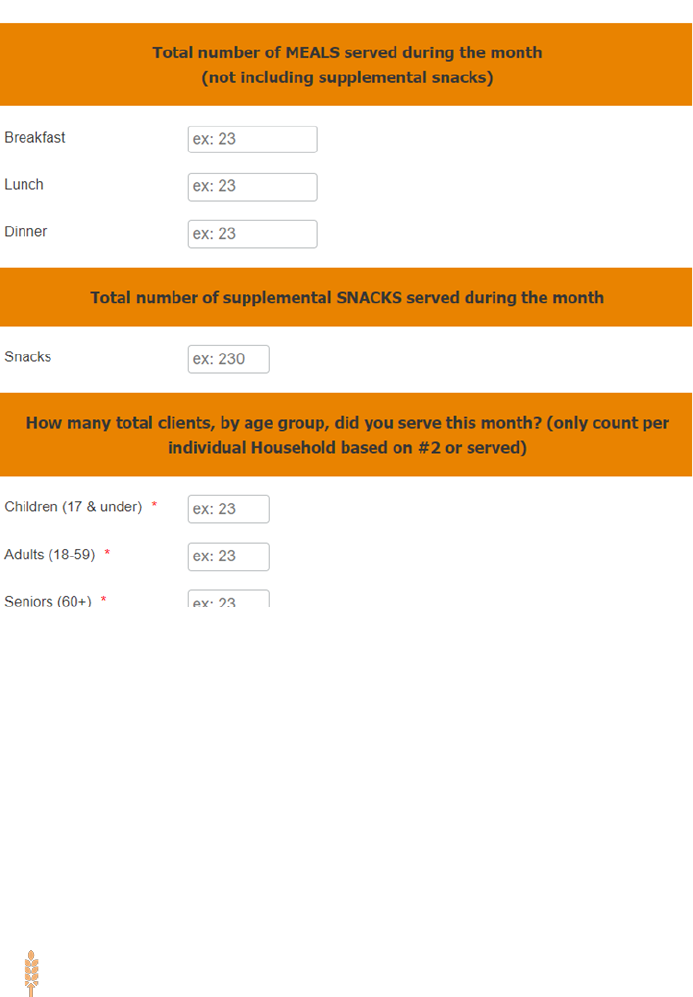
North Texas Food Bank 41
ONSITE & SUPPLEMENTAL REPORTING INSTRUCTIONS
For reporting, only count meals that were served that month:
1. This number is based on the total number of breakfasts served.
2. This number is based on the total number of lunches served.
3. This number is based on the total number of dinners served.
4. If you serve multiple snacks to the same individuals, you must count all snacks served.
This number is derived from the total number of clients you served. It breaks down into 3
groups, and you only count that individual once per month no matter how many times they
come in that month. Most agencies retrieve this data from their sign in sheets.
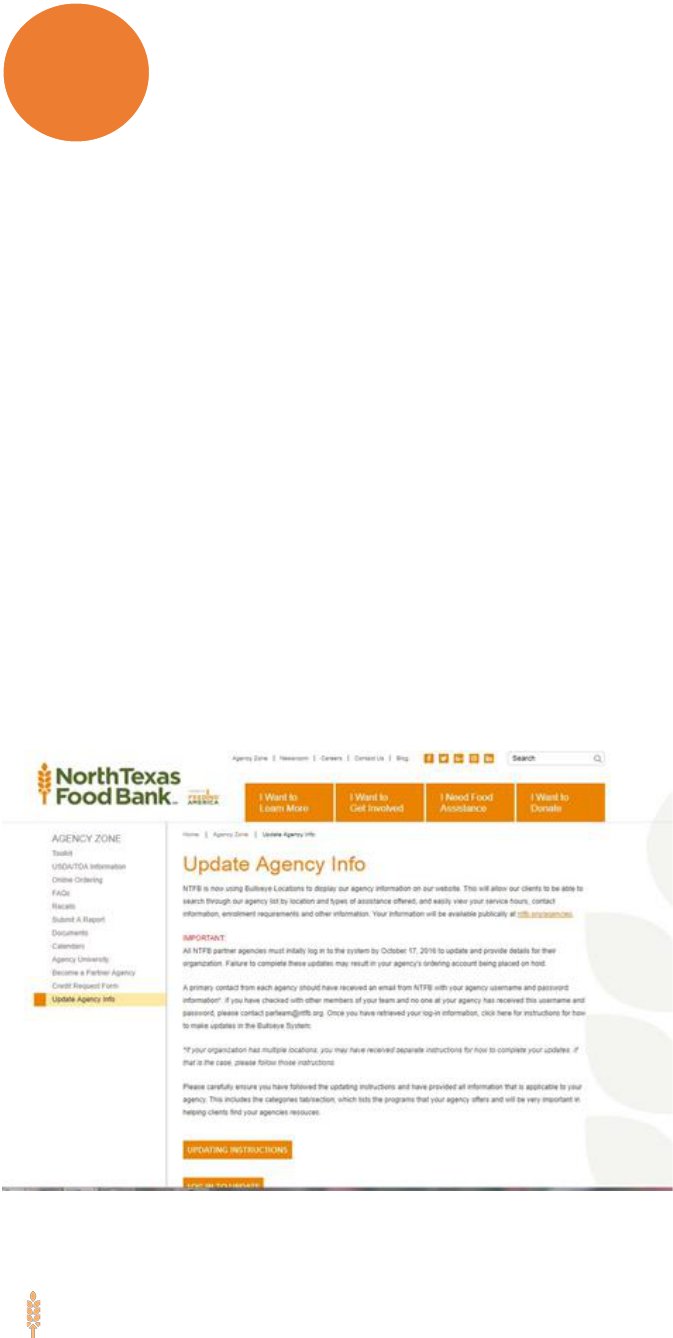
North Texas Food Bank 42
Partner Agency Accounts
As a Partner Agency of the North Texas Food Bank, you will receive an account that is tracked
by an assigned ID number. The account contains all the relevant information such as your
program director, mailing address, physical address, county, fax number, phone number, and e-
mail address.
Multiple Programs
If an Agency has multiple programs, each account will be treated as a separate entity. Each
program must order and submit monthly reports separately.
Changes to Accounts
Please notify the Community Partner Relations Team of any changes within your organization
by submitting updates at Update Agency Info
• Staff Changes: Mailing address, phone number, fax number, administrative contact,
food contact or billing contact
• Organization Changes: Agency name, location, hours of operation, type of services
provided, or status of any licenses or permits
Section
7

North Texas Food Bank 43
Payment Terms
•
All payments must be submitted within 30 days from the invoice date. Monthly
statements are emailed to the Agency and should be used as a reconciliation of invoices.
•
Payments made after 30 days are considered late. Agencies with past due balances could
be placed on hold.
•
Please contact NTFB if your agency has difficulty meeting its financial obligations.
Payment Penalties
•
The Food Bank expects timely payment of your bill. It is important that all accounts be kept
up to date.
•
If an Agency account has invoices 30 – 60 days past due, the Agency will be contacted by
email and a request for payment will be made.
•
If an Agency account has invoices over 90 days past due, the Agency will be placed on
ACCOUNTING HOLD and will be unable to order food or receive produce until the account
is brought current.
•
If the Food Bank receives a returned check, the Agency will be contacted. Repayment
should be in the form of a money order or cashier’s check. A $25.00 returned check fee
will be applied to the account.
Credit Limits
All accounts have a credit limit established by NTFB based on your Agency’s budget. If your
Agency reaches the credit limit, you will not be able to place an online order. Once a payment
history has been established with NTFB, your Agency can request a credit limit increase by
completing the form located in the Agency Service Desk section of the Agency Zone on our
website.
VOLUNTEER CREDITS
Partner Agencies may receive credits to their account for volunteer service with the North
Texas Food Bank. Agencies will receive $1.80 for every hour of volunteer service provided.
Agency volunteers cannot exceed 50 hours, or $90.00, of credit for an Agency each month. The
hours accumulated for Agencies will be totaled at the end of every month. Agency credits are
noted on the monthly statements and should be applied against future invoices.
In order to volunteer, you must go online to submit a request. To find out about volunteer
opportunities, go to ‘The Volunteer Experience’ page on our website at
https://www.ntfb.org/volunteer

North Texas Food Bank 44
Monitoring & Inspection
Procedures
As a partner of NTFB, your Agency has agreed to adhere to and maintain certain standards by
signing the NTFB Partnership Agreement. Failure to comply with the Partnership Agreement
and the associated responsibilities could lead to the inactivation, or even suspension of your
Agency’s account with the Food Bank.
Site Visits
NTFB’s Partnership Agreement states that all Partner Agencies are to permit Food Bank
personnel to monitor the program, including the authority to check records and inspect the
facility. These monitoring visits are conducted every 2 years with a CPR team member.
Agency site visits are conducted in order to:
• Ensure the highest sanitation and food safety standards are being upheld
• Review agency record keeping practices, inventory processes, and storage conditions
• Improve and increase communications between the Food Bank and our Partner
Agencies
• Seek feedback on how we can better serve our partners and build capacity
A Community Partner Relations representative will contact the Partner Agency to schedule site
visits. Upon completion of a site visit, the CP representative will email the Partner Agency with
any non-compliance issues, which must be followed up within 30 days. If a Partner Agency fails
to resolve an issue within the 30-day timeframe, or has failed to respond to follow up inquiries,
the agency will be placed on administrative hold and cannot place orders until the issue has
been resolved.
Section
8

North Texas Food Bank 45
Agency Site Visit Checklist
Temperature Logs
Logs should be updated every day that your feeding program is
operating or a minimum of every other day, immediately after a
power loss is suspected or known, and late each Friday
afternoon and early Monday morning. All refrigeration units
should have a thermometer placed within them. Temperatures
should be 34˚- 40˚ refrigerated and -10˚- 0˚ frozen.
Food Storage Area
All food must be stored a minimum of 4 - 6 inches above the floor,
and a minimum of 1 inch away from the wall. Products should be
consistently rotated to prevent food from spoiling. The pantry and
kitchen areas should be neat and clean. The food storage area
should have the ability to be secured if necessary. Do not mix food
and chemicals.
Packaging
Heavily rimmed or seam-dented canned foods or packaged foods
without the manufacturer’s complete labeling should not be
distributed or made available to clients.
Food
Handler
Certification
This certification is required for at least one representative for all
Pantries and Supplemental Agencies and is good for 2 years. One
certification can be obtained through the Food Bank using an
online training system that is free of charge. You can also take
this class at your local community college or city/county offices.
Food
Manager
Certification
This certification is required for at least one representative for all
On- site Agencies and is good for 5 years. This certification can be
obtained through your local community college or city/county
offices.
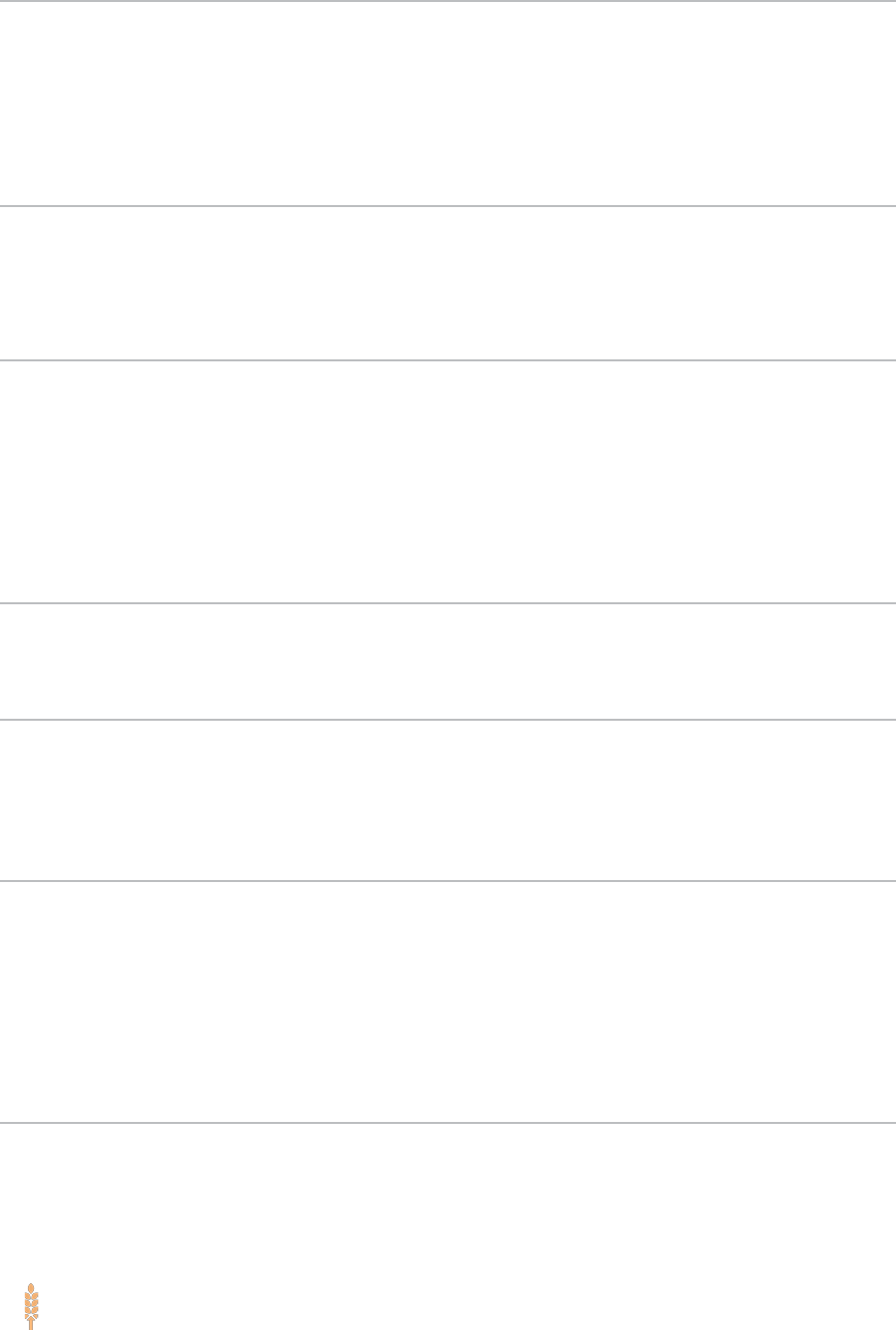
North Texas Food Bank 46
Health Inspection
A copy of this inspection is necessary for all on-site feeding
programs that prepare meals. There are a few exceptions; please
contact a member of the Community Partner Relations Team for
more details.
Pest Control
Ensure that a licensed pest control company treats all program
sites at least twice a year, and more frequently if there are signs of
infestation.
Qualifying Clients by
TEFAP Guidelines
(The Emergency Food Assistance Program) These guidelines are
provided annually by the State of Texas and used to qualify clients
to receive products and produce. Intake forms should be used to
gather income information from clients to determine their
eligibility.
Non-discrimination
statement
This disclaimer should be printed on your application, sign-in
sheet, pamphlet, or flyer.
Civil Rights Poster
This poster must be displayed in an area that is clearly visible to
the clients. The Community Partner Relations team can supply you
with a copy if your Agency does not have one.
Civil Rights Training
This training is required annually for all key staff and volunteers
interacting with applicants. Your Agency is responsible for
documenting the training by obtaining signatures on a training log.
The agency must retain the logs from the previous 2 years for
review at the Compliance Audit (CA) visit.

North Texas Food Bank 47
Posted Hours of
Operation
The days and hours must be visible to someone walking by the
building. Pantries must distribute food on a regularly scheduled
basis a minimum of once per week in urban areas for a total of at
least three hours a week, and a minimum of once per month in
rural areas for a total of at least three hours per month.
Board of Directors
Provide a current copy of your board members with contact
information.
Annual or
Monthly
Budget
Provide a current copy of your food budget or yearly spending
average.
Invoices
Must be signed by two different individuals and kept for at least 3
years.
Agency Compliance
Client Certification
•
The Agency must keep accurate records and screen clients annually to assure that
eligibility requirements are met.
•
Client information must be current and confidential. Records should be stored in a locked
cabinet.
•
Client must meet TEFAP income guidelines, which are 185% below the federal poverty
level. This guideline is to be used by all staff/volunteers that
•
conduct the intake process. This guideline is updated annually by the state of Texas.
•
If the client does not meet the income eligibility guidelines, he/she can be served on an
emergency basis. The Agency is required to record the reason for the client’s emergency.
Acceptable Practices
•
Place signs and pamphlets of a religious or secular nature in clear view of clients.
•
Restrict a client who is abusive or disruptive to your program or Agency. You should
document all these occurrences (see the NTFB Grievance Policy in the Download a
Document section of our website).
•
Distribute food received from other sources, provided that it is treated exactly like food
received from NTFB.

North Texas Food Bank 48
Unacceptable Practices
•
Discriminate against a client in any way in accordance with the Civil Rights of the client.
•
Require a client to provide a social security card or any other documentation related to
citizenship in order to receive food from your Agency.
•
Have a separate standard for handling, storing or distributing NTFB product from food
product procured from other sources.
•
Make stops of any sort after picking up product from NTFB or a delivery site for the safety
of all product.
•
Sell or barter NTFB products for goods and services from a third party.
•
Take any NTFB products for personal use.
•
Share any items received from NTFB with another organization (exceptions include bakery
and produce, with prior approval from NTFB staff).
•
Require clients to participate in a religious activity (i.e. pray, read, listen, etc.) as a
precondition to receive food.
•
Be inconsistent with your days and hours of operation.
•
Operate other feeding programs involving cost at the same time or place as NTFB
distribution.
•
Accept monetary donations at the time of distribution.
•
Charge a client a fee for any food service.
•
Use donated products for the purpose of fundraising. Ex: spaghetti dinners and bake sales.
Additional Agency Standards
•
If your agency has volunteers who are also clients, they should be served on a different
day than when they volunteer. Client volunteers should not receive special treatment;
they should go through the intake process, should not receive more food than non-
volunteers, and should not serve themselves. Volunteers must be eligible to receive food
by meeting the TEFAP income guidelines and not shown favoritism.
•
You do not “buy” food from the Food Bank but pay a “handling fee.” Internal Revenue
Service regulations prohibit the re-selling of donated food. While International Revenue
Service (IRS) regulations prohibit the re-selling of donated food, they specifically permit
food banks (and only food banks) to charge a small fee to help offset the costs associated
with handling donated food. This is what the North Texas Food Bank calls the handling fee.
As a Partner Agency you are not “purchasing” food from NTFB but being assessed this
handling fee. This fee represents less than half of all costs associated with making donated
food available to Partner Agencies by NTFB.
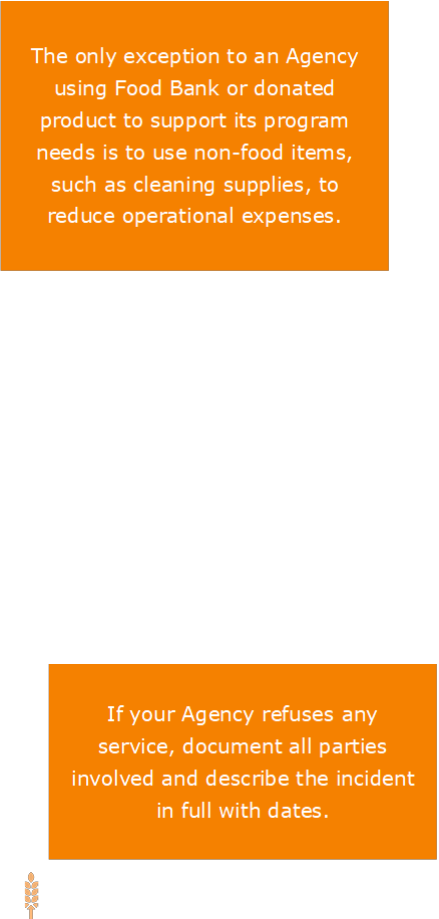
North Texas Food Bank 49
•
When discussing your partnership with NTFB with the public through your newsletters,
appeal letters, grants, websites, or media interviews, please do not make any reference to
“buying” food from the Food Bank. It generates an inaccurate impression and could
jeopardize the ability of individuals and businesses to receive tax deductions for their
product donations.
•
Each program is required to order Food Bank products separately according to the planned
use: on-site or pantry. If the Agency has more than one program at the same location,
products should be stored separately and used only for the specific program in question.
•
If your Agency or program is expanding, the new entity must undergo the same process of
application approval and a site visit must be conducted.
Right to Refuse Service
To maintain a high standard of service and provide a safe work environment for your
employees, volunteers, and client families, NTFB Partner Agencies have the right to refuse or
discontinue service to unruly clients. Services may only be denied to a client who acts
inappropriately by disrupting the normal provisions of services, or if a client’s behavior or
environment threatens the safety of the agency’s employees, volunteers, or clients.
•
Inappropriate behavior includes, but is not limited to the following:
•
Unreasonable demands for services
•
Threatening or erratic behavior
•
Misrepresentation for the need of services
•
Personally, threatening, or offensive language

North Texas Food Bank 50
Civil Rights
USDA and state guidelines define civil rights as the non-political rights and freedoms protecting
individuals from unwarranted action by government, private organizations, and individuals. Civil
rights ensure one’s ability to participate in the civil and political life of the state without
discrimination or repression.
Under federal law, any agency or organization receiving federal financial assistance is
prohibited from discrimination based on race, color, citizenship, religion, sex, national origin,
ancestry, age, marital status, disability, and sexual orientation including gender identity.
Every Partner Agency receiving USDA products must post the “And Justice for All” poster in a
noticeable place to illustrate to clients that your Agency conforms to all current civil rights laws.
Civil Rights Training
As a requirement of TDA/USDA, all volunteers and staff assisting with food and nutrition service
programs will need Civil Rights training annually. Signed documentation acknowledging an
understanding of the outline policies and procedures are to be kept on file for 2 years for all
staff and volunteers that come into direct contact with clients receiving assistance. Failure to
comply with this standard may result in an Agency account being placed on hold.
Civil Rights Disclaimer
Non-discrimination statement - This disclaimer should be printed on your application, sign- in
sheet, pamphlet, or flyer in its entirety. You may place this statement in English and in Spanish.
This statement declares that your Agency does not discriminate against any client.
USDA Nondiscrimination Statement (English)
In accordance with Federal civil rights law and U.S. Department of Agriculture (USDA) civil rights
regulations and policies, the USDA, its Agencies, offices, and employees, and institutions
participating in or administering USDA programs are prohibited from discriminating based on
race, color, national origin, sex, disability, age, or reprisal or retaliation for prior civil rights
activity in any program or activity conducted or funded by USDA.
Persons with disabilities who require alternative means of communication for program
information (e.g. Braille, large print, audiotape, American Sign Language, etc.), should contact
the Agency (State or local) where they applied for benefits. Individuals who are deaf, hard of
hearing or have speech disabilities may contact USDA through the Federal Relay Service at (800)
877-8339. Additionally, program information may be made available in languages other than
English.

North Texas Food Bank 51
To file a program complaint of discrimination, complete the USDA Program Discrimination
Complaint Form, (AD-3027) found online at: https://www.usda.gov/oascr/how-to-file-a-
program-discrimination-complaint, and at any USDA office, or write a letter addressed to USDA
and provide in the letter all of the information requested in the form. To request a copy of the
complaint form, call (866) 632-9992. Submit your completed form or letter to USDA by:
(1) mail: U.S. Department of Agriculture
Office of the Assistant Secretary for Civil Rights
1400 Independence Avenue, SW
Washington, D.C. 20250-9410;
(2) fax: (202) 690-7442; or
This institution is an equal opportunity provider.
How to Build Capacity
Community capacity building is defined as the “process of developing and strengthening the
skills, instincts, abilities, processes, and
resources that organizations and communities need to survive, adapt, and thrive in the fast-
changing world.” By doing these few things within your organization it will help build your
Agency’s capacity.
SNAP (Food Stamps) Outreach
NTFB has partnered with the Texas Health and Human Services Commission to assist clients
with completing the Supplemental Nutrition Assistance Program (SNAP) application to ensure
Health and Human Services receives a process ready application, including the required
documentation needed for the state to process and determine eligibility timely. Encouraging
clients to sign up for SNAP has many benefits such as:
• Dollars into your community
• More food on client tables by assisting with supplementing their food budget
• Reduced cost of Agency program
Agencies have different opportunities available to participate in SNAP Outreach. These include
training in application assistance for staff and/or volunteers designated to aid with SNAP
Assistance, having a SNAP Navigator assigned to your site to conduct one-on-one consultations
with clients, providing SNAP Referrals to the NTFB Social Services Assistance team to contact

North Texas Food Bank 52
clients to apply via phone or virtual platforms, or having a SNAP workstation onsite for client
use to be assisted virtually via a laptop or desktop computer. For more information, please
contact the SNAP team via email at [email protected]@ntfb.org.
Expand Hours of Operations
•
Be open evening hours or weekends
•
Offer serving hours when surrounding social service organizations are typically not
available
Agency University
Agency University (AU) is an online education program designed for Partner Agencies to
increase their knowledge in critical areas of Food Banking. Current courses include orientation,
civil rights training, Food Safety for Food Banking and updated USDA/TDA/TEFAP information.
Additional training on issues critical to our Partners is being developed.
Grievance Policy
Agency/Food Bank Grievance
If your Agency has a complaint or experiences a problem with the North Texas Food Bank
(NTFB), please contact the Sr.
Manager of Community Partner Relations with details of the grievance and every effort will
be made to resolve the matter. If unable to resolve the grievance to mutual satisfaction, the
Sr. Manager of Community Partner Relations will present the matter to the Chief Operations
Officer and/or the Chief Executive Officer as an appeal on behalf of the Agency. In such cases,
one of the following outcomes may result:
1. The COO/CEO will issue a decision and then notify the Partner Agency’s Executive
Director of the decision.
2. The COO/CEO will call a meeting of NTFB’s Executive Committee where they will make
a decision and then notify the Partner Agency’s Executive Director.
All grievances made against the Food Bank will be placed on file for at least 3 years and 90
days.
The decision of the CEO or the Executive Committee of NTFB is the final word on the
disposition of the grievance by an Agency.

North Texas Food Bank 53
Client/Partner Agency Grievance
If a client in your service area has a grievance with your Agency, the client has the
opportunity and right to contact the governing board of your Agency to appeal the decision.
If the client is not satisfied with the decision of the governing board of the Agency,
the client can contact the NTFB’s Community Partner Relations Team and file a complaint.
Community Partner Relations will then record the complainant’s information and contact the
Partner Agency to gather additional information. The objective and obligation of the NTFB is
to ensure that proper procedures are followed, civil rights are not violated, and equitable
treatment is afforded to all. The Grievance Procedure will be implemented as follows:
1. After a reasonable deliberation, the Food Bank will contact your Agency notifying you
of the complaint and of any information compiled during NTFB’s investigation.
2. If no wrongdoing is found with your Agency, the Food Bank will contact the
complainant and explain the investigation by NTFB, as well as the decision.
3. If wrongdoing on the part of the Agency is found, the Agency will receive a written
response from NTFB citing the outcome
1. of the investigation and will stipulate the corrective action(s) that must be taken by
the Agency.
4. All client grievances against an Agency should be documented and remain on file at
the Agency for at least 3 years and 90 days.
5. All client grievances reported to the NTFB will be kept in the Agency’s permanent file.
The decision of the NTFB is the final word on the disposition of the grievance by a client.
Partner Agency/Client Grievance
If your Agency has a grievance against a client, then a record of the incident should be kept at
the Agency for at least 3 years. NTFB will ask to see this record in the instance that the client
seeks to issue a complaint with NTFB against that Agency. NTFB advises completing a form
for instances including but not limited to:
1. Physical and/or verbal confrontations
2. Removing someone from the premises
3. Refusing service to a client either temporarily or permanently

North Texas Food Bank 54
*Under each category listed above, there is an opportunity to appeal any decision onetime
only.
*There will be no retaliation by any parties during the grievance process.
Ethics and Report and Fraud and Misuse of USDA Foods
In an effort to be more authentic and transparent, the North Texas Food Bank has selected
Ethics Point to provide Partner Agencies, clients, volunteers and NTFB employees a simple
way to anonymously and confidentially report activities that may involve violations of the
Food Bank’s Code of Conduct, misuse of USDA Foods to TDA, criminal conduct or other
unethical behavior by the Food Bank or its Partner Agencies. Include information on the
amount of USDA foods involved, location of the incident, suspected parties, and other details
and facts. The Texas Department of Agriculture may be contacted at the Dallas/Ft. Worth
community Operations Office. Ethics Point is an independent, third-party provider, and
operates 24 hours a day, 7 days a week.
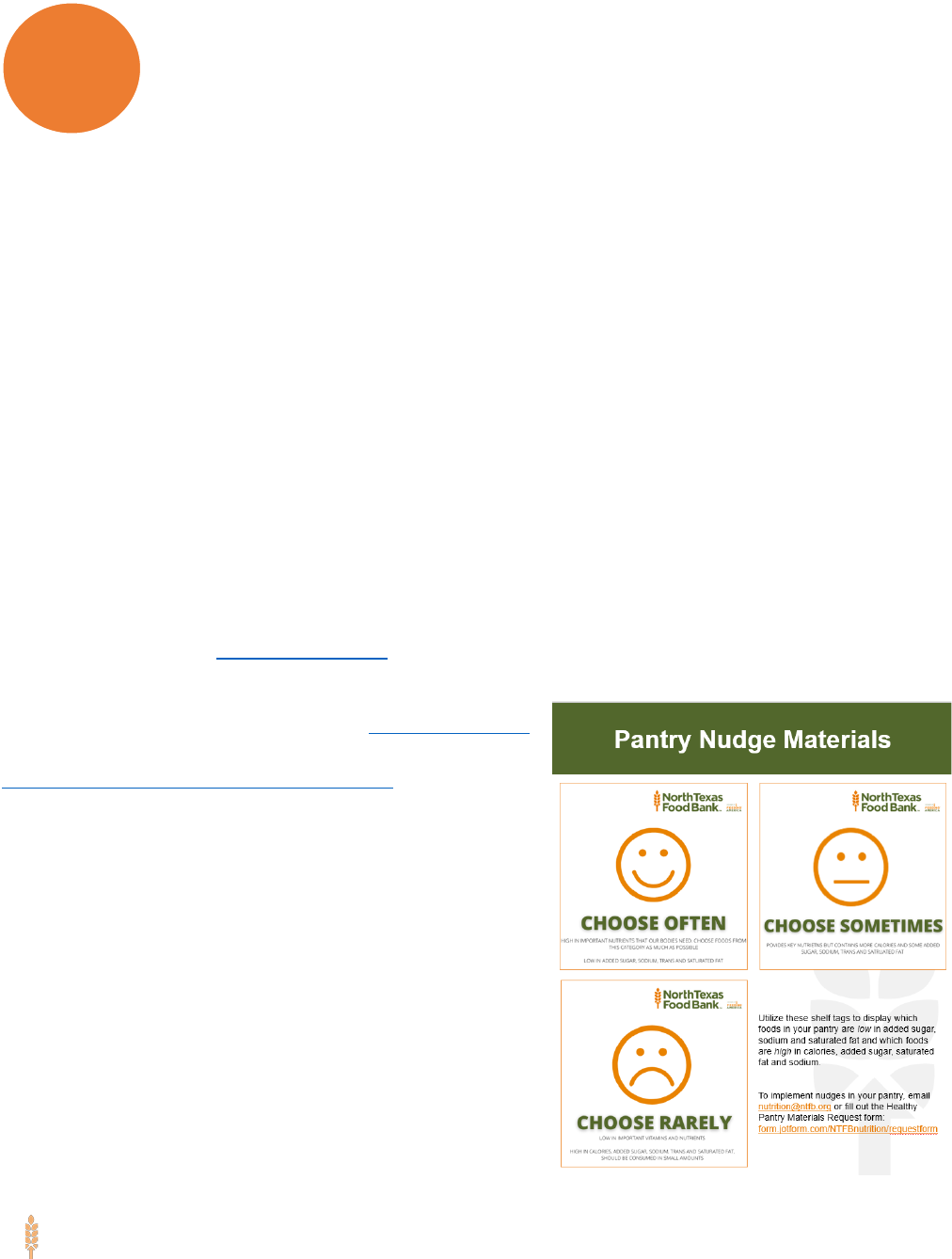
North Texas Food Bank 55
Additional Services &
Misc. Information
Additional Resources
Agency Zone
The NTFB’s website is a source for both the public and for partners of our hunger-relief
network. The Agency Zone Section of the website is continually growing and developing to
meet the needs of our network. Currently, the following resources are available on ntfb.org
under Agency Zone:
• Online Monthly Report Submission
• Online Ordering
• Downloadable forms
NTFB Partner News: Monthly Newsletter
NTFB Agency Newsletter is emailed to each partner agency on a monthly basis. The newsletter
focuses on special issues, stories of success and topics of interest in the effort to end hunger. If
you have suggestions or would like to see a specific issue addressed in the newsletter, please
contact the CPR Team ([email protected]).
Pantry Nudge program
To implement nudges in your pantry, email nutrition@ntfb.org
or fill out the Healthy Pantry Materials Request form:
form.jotform.com/NTFBnutrition/requestform
Section
9

North Texas Food Bank 56
FAQ’s
Online Ordering
How do I get set up as a user? Your Agency will receive online ordering access information
before or immediately after your orientation. If you would like to add users, please email
[email protected] with the name of the user including the email address, agency name
and number. Who should be set up as a user?
We recommend that your Agency Director, Pantry Manager or Food Contact person, and
your Cook (if applicable) be set up as users. There is currently no limit on number of users per
Agency.
Can I add something to my order after I have submitted my cart?
Do not add to your original order.
You can simply place an additional order as long as it is 2 business days prior to the pick up or
delivery time of your previously
submitted order. Submitting multiple orders for the same delivery/pick up date and time is
perfectly acceptable. We do ask that you be conscientious when placing multiple orders and
limit them. We recommend that you do not use the pencil icon to edit your order. Doing so
may result in you losing some items.
When will I be notified of my order status?
After ordering through the online shopping system, you will be emailed an
acknowledgement letting you know that your order request has been received by the Food
Bank. Approximately 24-36 hours before your pickup or delivery date, you should receive
another email stating that your order has been processed. At that time, you may check the
order management component of the shopping system for your order status that will say
“Released.” If you have any questions, you may contact Order Services at [email protected].
What are handling fee items (HF)?
Handling Fees are fees that an Agency pays to share in the cost of shipping, handling and
storing items. Items with a handling fee of $0.14 cents a pound come from sources like the
USDA, Feeding America, and local product donors. Items listed at $0.28 cents per pound are
purchased by the Food Bank at retail value.
When is my order due?
Your order is due 2 business days before your scheduled delivery time or your chosen pick up
date. Example: I normally receive/ pick up my order on Monday, so my order must be
submitted by close of business on Wednesday, allowing Thursday and Friday for my order to
be processed.

North Texas Food Bank 57
What if I did not place my order in time?
Wednesday, allowing Thursday and Friday for my order to be processed.
Unfortunately, you will not receive an order due to the policy in place to ensure prompt and
accurate orders for every Agency. No exceptions can be made to this policy
How often is the shopping list updated?
The shopping list is represented in real-time, so items and quantities can change as often as
every 3 minutes. You must refresh the online page in order to see the real-time status of a
product. Remember, items are on a first-come, first-served basis. Depending on the number
of orders, some items may be out of stock by the time an Agency’s order is processed.
Distribution
Do I pick up my order by appointment or walk in?
All orders are processed according to the appointment schedule set in the online shopping
system from 7 a.m. to 11:30 a.m., Monday through Friday and is selected by the Agency at
the time of placing their order. Produce, bakery and Add- On items will also be available
during those dates and times if available.
Can I add something from this week’s shopping list to last week’s order?
Do not add to your original order.
You may place an additional order as long as it falls into the 48-hour timeframe.
Example: If an order was place on Thursday to pick up on Tuesday and there are items that
you would like to add then you can place an additional order before the 2 business days,
deadline which would be Thursday close of business.
What are add on’s? Is there a cost for these items?
Add-ons are handling fee items of limited quantity that are available only at Dan Morton
warehouse and are not on the online shopping list. You must fill out an add-on form before
shopping in pick and weigh to receive these items.
Is it appropriate to tip NTFB staff for their help or support of our agencies?
Although we greatly appreciate your sentiments, it is not appropriate to tip individual staff
members for their assistance and support. In fact, personally accepting a gift is against
company policy and we ask that employees not be put in a position of having to choose
whether to accept a personal gift. Tipping a NTFB staff member can jeopardize the recipient’s
job and be grounds for loss of Agency membership with NTFB. If you would like to give a
donation
or contribute in some general way to the Food Bank, please contact the philanthropy
department, and they will inform you of any needs and ways in which to donate.

North Texas Food Bank 58
Is it appropriate to give gift cards to NTFB staff to show appreciation?
NTFB staff is not allowed to accept personal gifts or gift cards from partner agencies
or their staff. If an Agency wishes to give a personal gift or gift cards, the donation will be
immediately given to the Human Resources Director to make the gifts
available to all staff through a raffle drawing.
Can I bring food and snacks to share with NTFB staff?
It is acceptable to do so if the items are not intended for one particular staff member and will
be made available for all NTFB staff.
Do I need to keep my invoices?
Yes, it is a requirement to keep all NTFB invoices with two signatures for three years.
What if my invoice is incorrect?
You will need to mark the corrections directly on the invoice and return it to the person at
the Agency Distribution desk for verification in the Agency Distribution area. If you are
receiving your order via delivery, mark the corrections on the invoice and have the driver
verify and initial the changes. The driver will return the invoice to the orders department of
your behalf for correction. You will be issued a credit for those items not received as long as
we receive a corrected and signed invoice. You have 3 business days to notify Order Services
of any discrepancies by email to [email protected].
Delivery
What should I do if the driver is late?
We ask that you give the truck 30 minutes past the set time, in case driving conditions or
cargo loading causes late arrival. If the truck is over 30 minutes late, contact NTFB Logistic or
Supply Chain at 214.330.1396 and we will provide you with an estimated time of arrival.
How should the produce be divided between the Agencies?
In general, any produce sent in bulk should be dispersed EVENLY between the partners. If
a partner needs more or less of the produce, that should be discussed and agreed upon by
the partners and not solely decided upon by the Site Coordinator. If you receive produce in
bulk to share, NTFB invoices on an agency rotation to evenly distribute weight for the
agencies so no one agency gets credit for all produce pounds. If any questions of fairness
arise, contact the Community Partner Relations Team at [email protected]g
Do I need to have my pallet cover when picking up?
All Partner Agency representatives receiving refrigerated products either from the NTFB or
group delivery sites will be REQUIRED to use the pallet blanket(s) to transport the goods.
Every Partner will receive one blanket at no charge, any additional blankets needed there is a

North Texas Food Bank 59
cost associated. If your agency needs a replacement or additional blankets, please email
[email protected] for those.
Compliance Audit
Do I have to complete Civil Rights Training every year?
Yes, you must have any staff and volunteers who regularly interact with clients trained on
civil rights standards, per USDA guidelines. This training must be conducted yearly and the
time of training is the discretion of the agency. A training log must be signed for
all that attended training and that log must be kept for 2 years. The training video is available
on the Agency Zone Webpage.
How long does a Food Handler and Food Safety Manager Certification last?
Food Handler Certification is good for two years, Food Safety Manager Certification
is good for 5 years. The Food Handler Certification is a requirement for all pantries and
Supplemental Programs and the Food Safety Manager Certification is required for all on-site
feeding programs (meaning they prepare and serve food at the Agency). All agencies should
have one of these certifications.
When do I need a health inspection from the city?
Whenever you are cooking food for others, your kitchen must be inspected by the city or
state and must meet their local health regulations. These inspections times may vary, check
with your county or city to get inspection policy. This includes daycares, senior centers, soup
kitchens, shelters and any other program that prepares and serves hot meals.
What do I do if our location changes?
Inform a member of the Community Partner Relations Team immediately for a site
evaluation and approval and request an address change from the IRS so they can update your
501(c)3. We will need a copy of their confirmation for our records.
Can I give food to anyone who looks like they need it?
Food provided by the Food Bank can only be given to clients that meet financial eligibility;
those levels are provided by the state, to us and our member network. In case of one-time
emergencies, you may provide food to anyone who states they have a need. Upon a return
visit by this person, you will need to gather their household income and compare with the
states TEFAP income guidelines.
Can we fundraise by using food provided by NTFB?
Food provided by the Food Bank may never be given in return for currency, merchandise,
volunteer efforts or any other in-kind payment system. Any of the above-mentioned activities
may be grounds for loss of membership with the NTFB.

North Texas Food Bank 60
How many times must I update the temperature logs?
Logs must be updated every time your program is in operation or a minimum of twice per
week, whichever is more. Logs must be taken on all freezers and refrigerators.
Can we pray or have clients attend a religious service before giving out food?
Religious programming cannot be required for receiving food assistance. Signs and literature
can be present and made available at the site, as well as invitations to participate in activities
after food is provided to clients provided it is made absolutely clear that participation is not
mandatory.
What if we want to change our distribution times to clients?
Inform the Food Bank immediately if you change distribution times. Remember, NTFB
Partner Agency pantries must be open to the public a minimum of once per week for at least
three hours in urban areas and minimum of once per month in rural areas for a total of at
least three hours per month as
stated in your Partner Agency Agreement.
What do I do if I want to begin an additional feeding program?
Please inform the Food Bank of your desire to add a program, and we will inform you of the
process of receiving permission and changing your member status. DO NOT use Food Bank
product in a program that has not been properly approved by the Food Bank.
Monthly Reporting
When is my monthly report due? What if I fail to turn in my report?
Reports are due by the 5th of each month, for the previous month. If you fail to submit your
reports your account can be placed on hold and you will not be able to place any new orders
or receive produce or add-ons.
Why is the purpose of monthly reports?
NTFB uses these numbers to report to Texas Department of Human Services to determine
future allocations of USDA commodities.
These numbers are also provided to Feeding America to use as hunger facts when procuring
food products and lobbying for more funds allocated through Congress.
How do I know that I have correctly submitted my monthly report?
Once you have submitted the report, you should receive an email confirmation to the email
address you have entered.
Should I keep a hard copy of my monthly reports and for how long?
You should keep an electronic copy or a hard copy for at least 1 year.

North Texas Food Bank 61
What should I do if I am having technical issues with my computer, and cannot transmit my
monthly report? Contact the Community Partner Relations
Team via email at [email protected] or by phone at 214-330-1396, letting them know of
the issues. Since the monthly reports are submitted via our website, you can enter your
reports from any computer (Ex: Library, home or someone else’s computer).
What questions should I put on my client intake forms to make the monthly reporting
process easier?
Pantry programs intake forms can include names and age breakdown of each household
member receiving assistance On-site feeding programs can gather their numbers based on a
sign-in sheet or an intake forms.
What do I do if I forget my Agency Zone password?
Contact the Community Partner Relations Team at [email protected] to retrieve your login.
What if I do not get my monthly report submitted by the 5th of the month?
Your Agency could get placed on hold until that report is received and entered. If your agency
is placed on hold, please allow up to 24 hours after you have submitted your report for the
hold to be removed. That means you will not be able to receive an order or pick up any
produce.
Accounting
If I cannot locate my copy of an invoice, who do I contact for a reprint?
Please be careful to file your invoices so that this is not a recurring event. If you do happen to
misplace an invoice, you can e-mail your request to the NTFB Accounting Department at
[email protected]. Please include your Agency name, phone number and the invoice number
that you are requesting copies of.
When I make a payment, how do I know that it has been received?
Currently, we do not have a feature that will allow you to see your payment that is received
during the month in which you paid. Look at the following month’s statement and see if the
invoices that you paid previously are listed as outstanding. For further information on those
invoices, open please email [email protected].
When should I expect my statement?
Usually, they are mailed by the 5th of each month. If you do not receive your statement by
the 18th, please contact the Accounting Team at [email protected].
What happens if I am past due?
If your Agency account has invoices 61-90 days past due, the Agency will be contacted
notified by email. If your Agency account has invoices over 90 days past due, the Agency will
be placed on accounting hold and will
be unable to order or receive food until the account is brought current.

North Texas Food Bank 62
Can I pay in cash?
We do not accept cash or personal checks. You must pay using a company check, cashier’s
check, or money order.
Can I view my balance online?
Not at this time.
Food and Nutrition Information
How should you handle nutrition requests from special needs clients?
Many of your clients may be facing health problems such as diabetes, heart disease,
hypertension, and obesity. Others may have food allergies, cultural preferences, and cooking
limitations. All these factors may affect the appropriateness of the foods your pantry or
feeding program provides.
The first step is to know your population. Do your best to know what issues your clients are
facing and concerned with. While you do not need to cater to everyone individually, simply
getting a collective idea of what your clients’ needs are will be extremely helpful.
Overall, as a NTFB Partner Agency, you should try to offer the best variety of nutritious foods
available, regardless of health needs. If you are doing your best to provide staple items that
are low in fat, sodium, and sugar and those that are high in fiber, vitamins, and minerals,
then you are likely meeting the needs of a majority of your clients and contributing to their
better health.
Unhealthy foods are inevitably available but try to limit the frequency and amount offered to
clients. All foods can be part of a healthy diet in moderation. It is important to balance out
your grocery and menu items with more nutritious options whenever possible.
How do you build a healthy package of groceries for a family?
A nutritious grocery package should include components from different food groups,
including grains, fruits, vegetables, protein, and dairy. Refer to the samples of food pantry
guidelines in the appendix of this guidebook. These guidelines are personalized based on the
MyPlate recommendations on gender, age, and activity level. Calorie levels are listed for each
individual and converted to family packages. This takes the guesswork out of knowing
whether you are giving too little or too much food and ensures that your clients are getting
the nutritious food they need to nourish their families. Once you know what items to stock
your pantry with, it’s easier to make the appropriate decisions when ordering online from
NTFB or purchasing additional groceries from another source.
If you are an on-site feeding program, what components should be included to create a
well-balanced meal?
Use Choose MyPlate (choosemyplate.gov/) to plan your on-site meals. Ideally, half your plate
should be fruits and vegetables. Focus on whole fruits and vary your vegetables. The more

North Texas Food Bank 63
colorful the better! Be sure to make half your grains whole grains as they are higher in fiber
and keep you full longer. Mix up your up your proteins to include beans and peas, unsalted
nuts and seeds, eggs, lean meats, and poultry. Don’t forget your dairy. Try to focus on low-fat
or fat-free milk/yogurt. You might decide to serve all the items separately or to combine
some of them in a casserole. For example, you could serve a chicken drumstick with some
rice, broccoli, carrots, and a glass of milk, or you could serve spaghetti with meat sauce along
with salad and a glass of milk. In the first meal, all the components are served separately. In
the second meal, there are three components in the spaghetti (pasta, tomato sauce, and
ground meat) and the other components are served on the side.
Meal planning can be a fun and creative activity. If you run out of ideas, try searching recipe
sites like hungerandhealth.feedingamerica.org/healthy-recipes/ or visit the Nutrition Services
page on NTFB’s website for recipes (ntfb.org/recipes/) and cooking demonstrations
(ntfb.org/cookingdemos/).
Why is it important to partner with NTFB to provide nutrition education for your clients?
Eliminating hunger takes more than just providing a quick fix meal. Eliminating hunger
requires both short- and long-term solutions including food AND education. Providing
nutrition education to low-income clients makes a tremendous difference in the quality of
their lives.
They learn the life skills needed to cook, shop, and make better food choices, allowing them
to feed their families nutritious meals on a budget. NTFB is making an effort to provide
quality, nutritious food to those you serve. We also provide ongoing nutrition education
classes, workshops, and materials upon request. For our Food Resources Management
Courses (Cooking Matters) and for additional workshops or materials, contact the Nutrition
Services Team ([email protected]).
Become a Healthy Pantry or a Nudge Pantry.
The Healthy Pantry Project promotes health and healthy eating by improving policies,
systems, and environmental changes at food pantries! The healthy choice is made the easy
choice by improving the way healthy food is ordered, displayed, and promoted. A Nudge
Pantry implements nudge strategies (shelf tags, nutrition education signage, recipe cards,
food demonstrations, etc.) at their pantry while a Healthy Pantry implements policies and
systems in addition to nudge strategies. For more information on becoming a Healthy Pantry
or Nudge Pantry, contact the Nutrition Services Team ([email protected]).
For more resources and updates, check the Nutrition Services page on the North Texas
Food Bank’s website. (ntfb.org/our-programs/nutrition-services/)
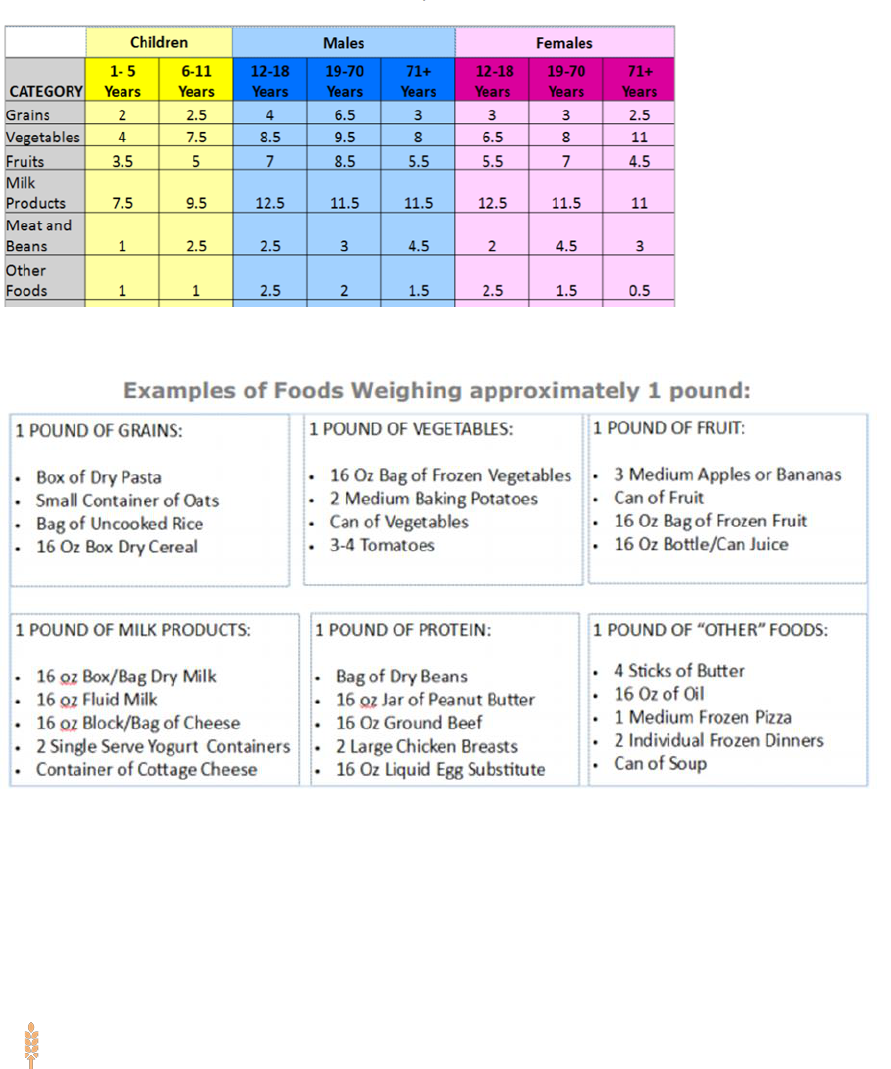
North Texas Food Bank 64
7-Day Supply Guidelines
How much food does a family need for 7 days? The chart below shows approximately how
many pounds of food from each food group an average adult need for seven days. This is only
meant to serve as a general guideline and does not guarantee all nutrient needs will be met.
Individual needs vary by height, age, activity level, gender, and various other factors. Totals
have been rounded to the nearest 1/2 pound.
Examples of Foods Weighing approximately 1 pound:
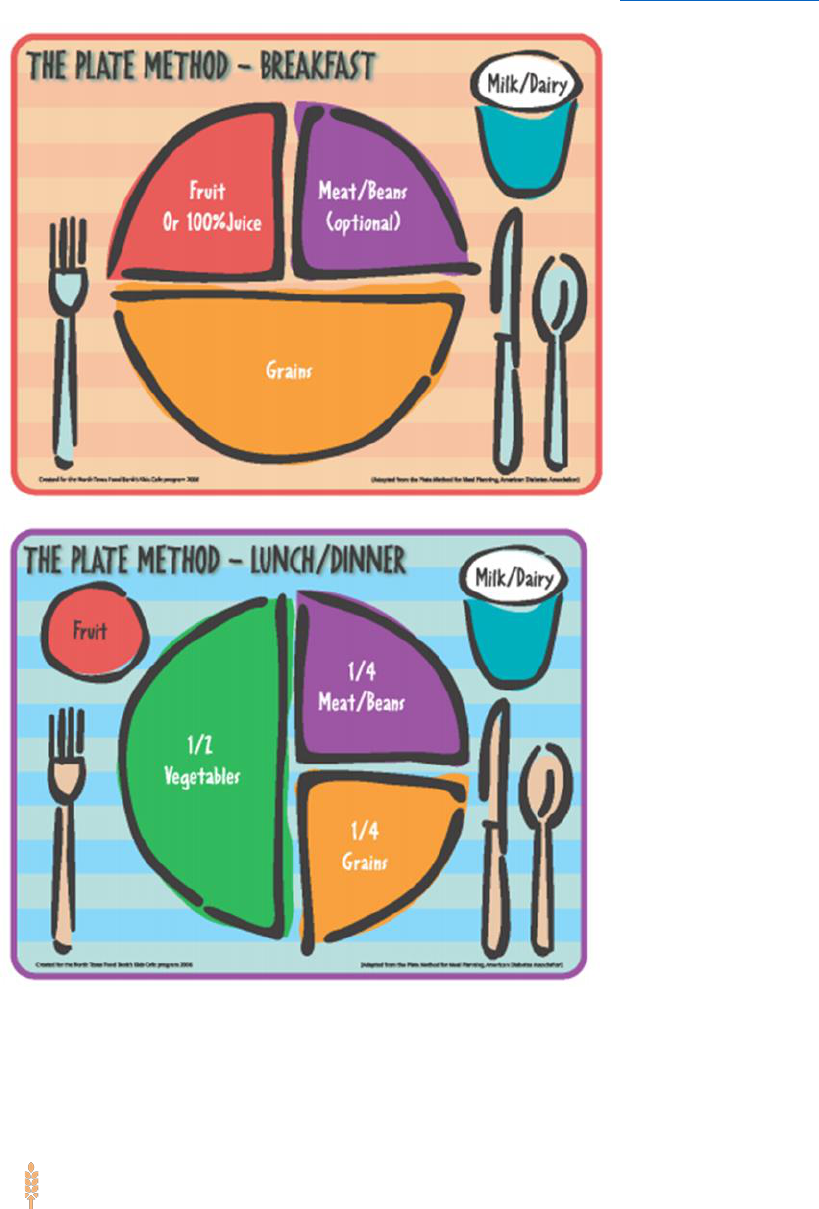
North Texas Food Bank 65
On-Site Meal Guidelines
The Plate Method is one way to visualize portion sizes for the food groups. (Children will utilize
a smaller plate.) This method is like the MyPlate visual, which is another valid model to use. To
find more nutrition information and healthy eating advice visit: choosemyplate.gov/.

North Texas Food Bank 66
Glossary
Agency University (AU) - An NTFB education program that provides continuing education for all
Partners.
Best Practices – A method consistently showing results superior to those achieved through
other means; the process of developing and following a standard way of doing things which can
be utilized by various organizations.
Billing Statements – Usually, they are mailed by the 5th or 6th business day of every month. If
you do not receive your statement by the 18th, please contact Accounting at acctrec@ntfb.org.
Child and Adult Care Food Program (CACFP) – Plays a vital role in improving the quality of
daycare for children and elderly adults by making care prepared meals available during care
hours.
Compliance Audit– Partner Agency monitoring visit conducted every two years by a member of
NTFB’s Community Partner Relations Team.
Commodity Supplemental Food Program (CSFP) – Provides commodity food packages for low-
income pregnant and breastfeeding women, other new mothers up to one year postpartum,
infants, children up to their sixth birthday, and elderly persons at least 60 years
of age who meet income eligibility requirements.
FDA (Food and Drug Administration) - Protects the public heath by assuring that foods are safe,
wholesome, sanitary and properly labeled and that drugs, and vaccines and other biological
products and medical devices intended for human use are safe and effective.
Food Forecast – A quarterly publication of core items that will be available through NTFB over
the next three months in order to meet the needs of your Agency.
Grievance – A formal process of identifying and resolving a complaint or unjust act.
Poverty Guidelines – Established by the United States Department of Health and Human
Services as an indicator of poverty based on income and utilized in establishing income-based
eligibility for program participants. The guidelines are updated annually.
Handling Fee (HF) – Fee that is paid by the Partner Agency when ordering from the Food Bank
to cover shipping, handling and delivery costs.
Inclement Weather – The existence of severe climate conditions resulting in excessive weather
circumstances which inhibit normal productivity.

North Texas Food Bank 67
Map the Meal Gap – Feeding America’s publication on food insecurity rates
in counties throughout the U.S. Visit feedingamerica.org/mapthegap to learn more.
On-Site Program – Type of Partner Agency program that prepares and/or serves food to be
consumed at any type of shelter, residential or soup kitchen.
Pantry – Provides groceries for families to take home and prepare.
SNAP (Food Stamp) – SNAP offers nutrition assistance to millions of eligible, low-income
individuals and families
and provides economic benefits to communities. SNAP is the largest program in the domestic
hunger safety net.
Supplemental Program – Serves snacks in an afterschool setting similar to a Boys & Girls Club
or YMCA.
Emergency Food Assistance Program (TEFAP) – A Federal program that helps supplement the
diets of low-income Americans, including elderly people, by providing them with emergency
food and nutrition assistance at no cost. It provides food and administrative funds to States to
supplement the diets of these group.
USDA (United States Department of Agriculture) – Cabinet level agency responsible for federal
programs related to agriculture.

North Texas Food Bank 68
Documents Available on the Website
Download a document: This is a complete list of available documents in printable form.
https://www.ntfb.org/agency-zone/documents
Partner Agency Agreement
Sorting 101
Credit Limit Increase Request Form: This form is to be completed by an Agency that would like
to request an increase to their online shopping credit limit.
https://form.jotform.com/83464622972161
Food Forecast: This forecast is designed to help your agency to know what items NTFB is
expecting from USDA. This is updated on a quarterly basis for the upcoming quarter.
Recalled Product List: This list is to identify any product that has been received by the food
bank and directs agencies on how to discard product appropriately.
https://www.ntfb.org/Agency-Zone/recalls
Client Focus
NTFB is committed to serving people in need in a respectful, dignified manner. We require
partner agencies to be compliant with civil rights laws – and encourage agencies to
continuously strive to improve their services for the betterment of their clients and their
community.
Client Experience
NTFB believes it is important to share information about the lived experiences of people in
need. Resources are available to help inform program leadership, volunteers, and the
community about the struggles faced by those who are food insecure.
Feeding America Research
The Foodbank is part of the Feeding America network, the largest charitable response to
hunger in the United States. Feeding America conducts research to provide insight into the
needs and experiences of our hungry neighbors. Research can be found at
https://www.feedingamerica.org/research
